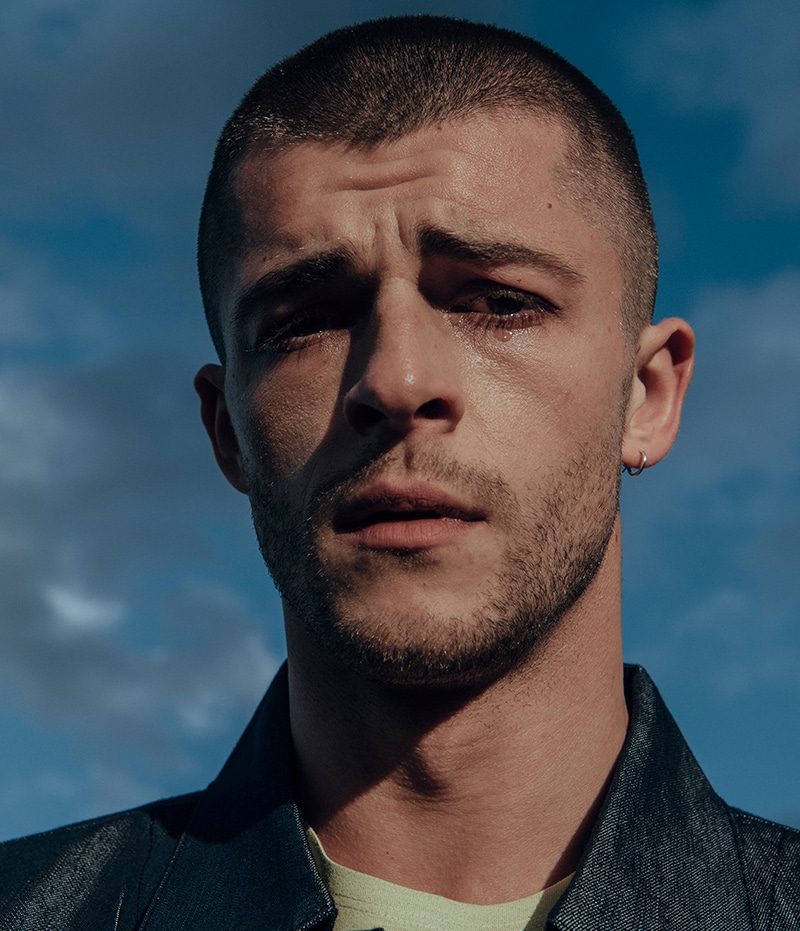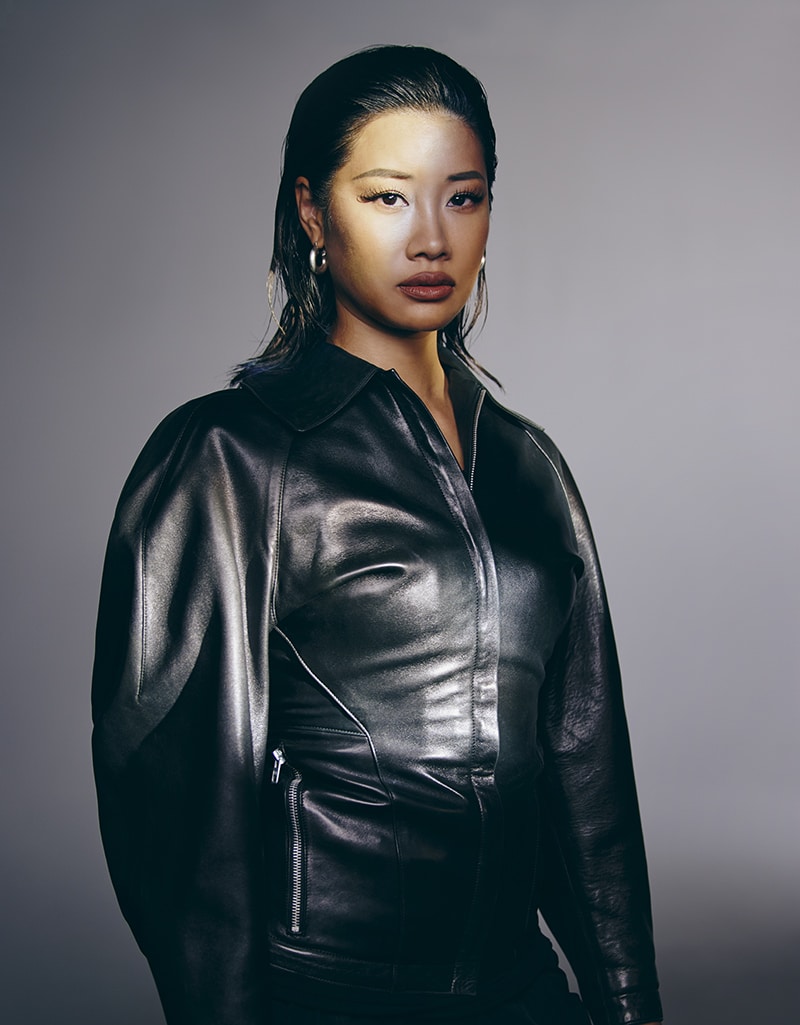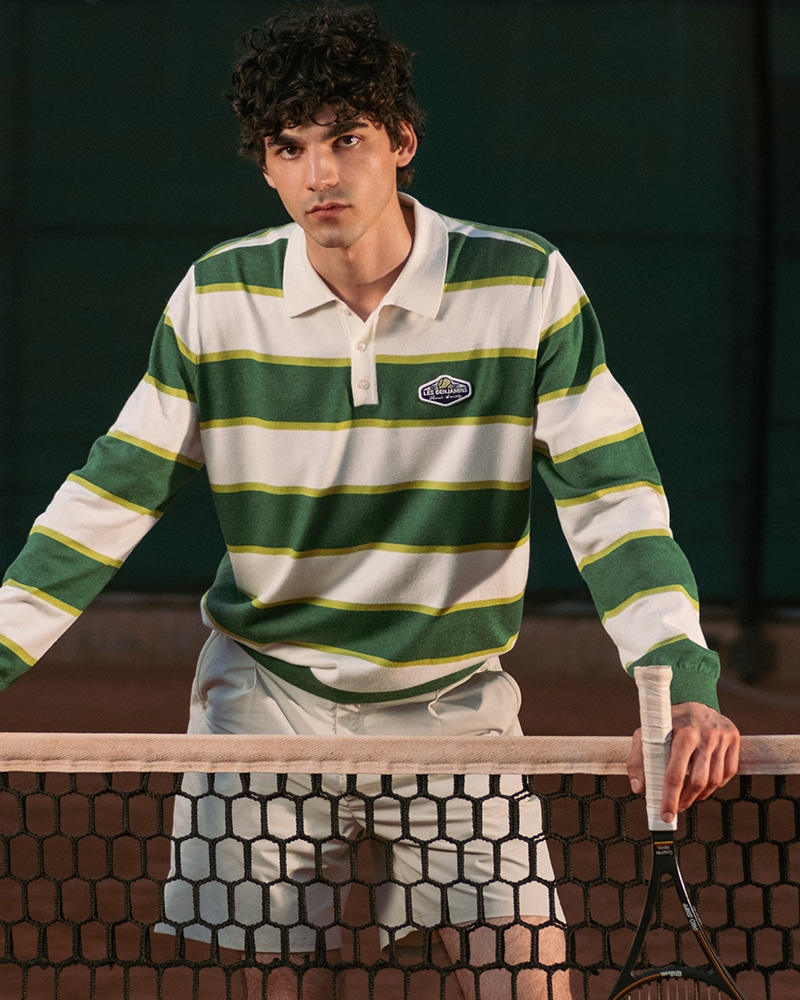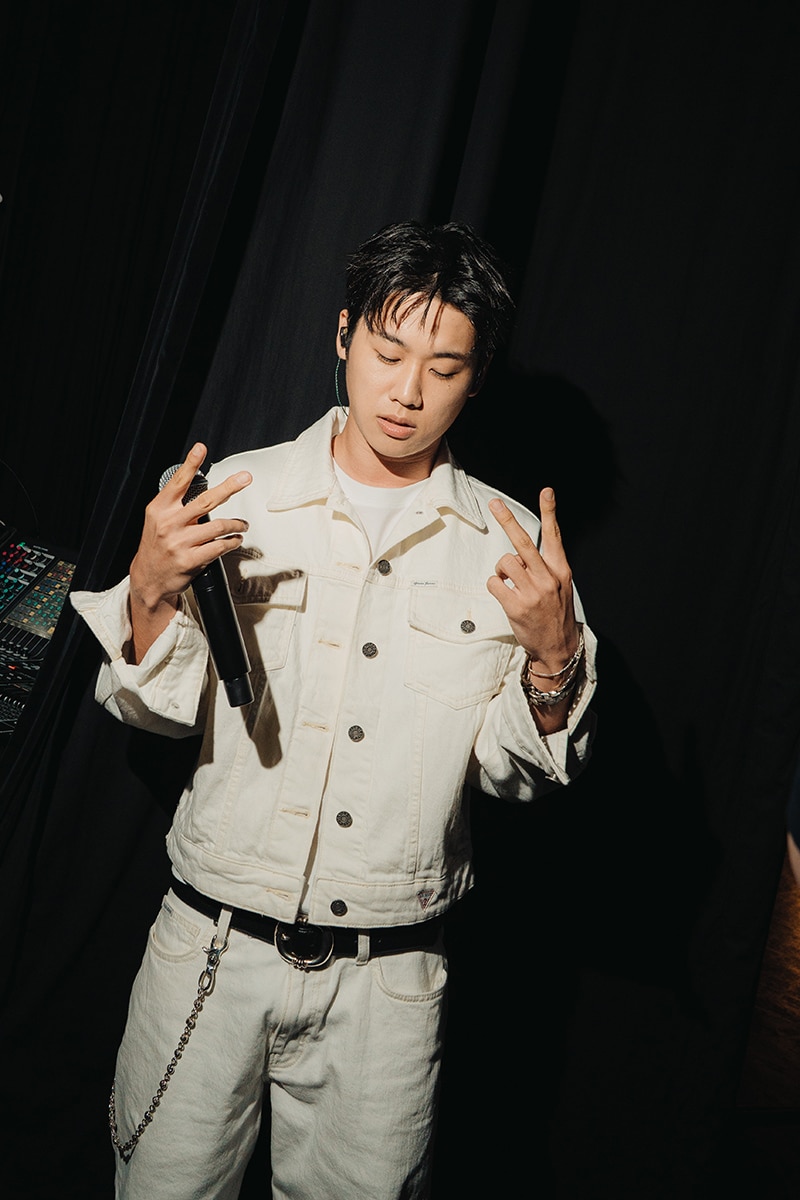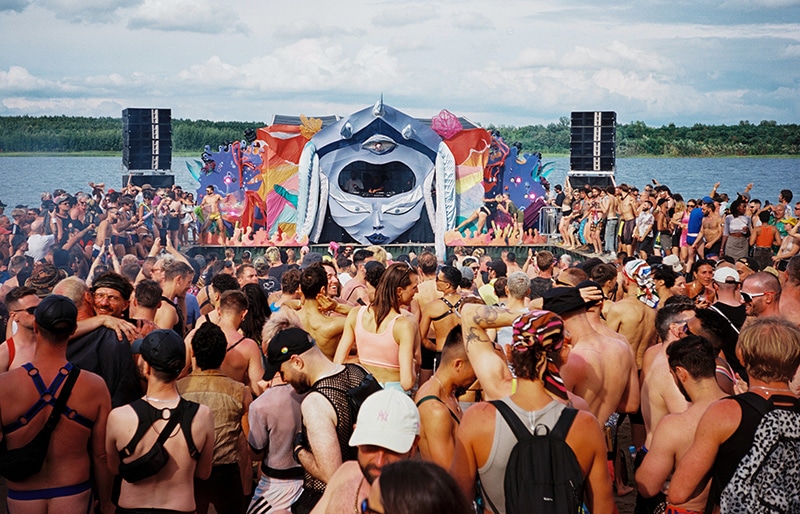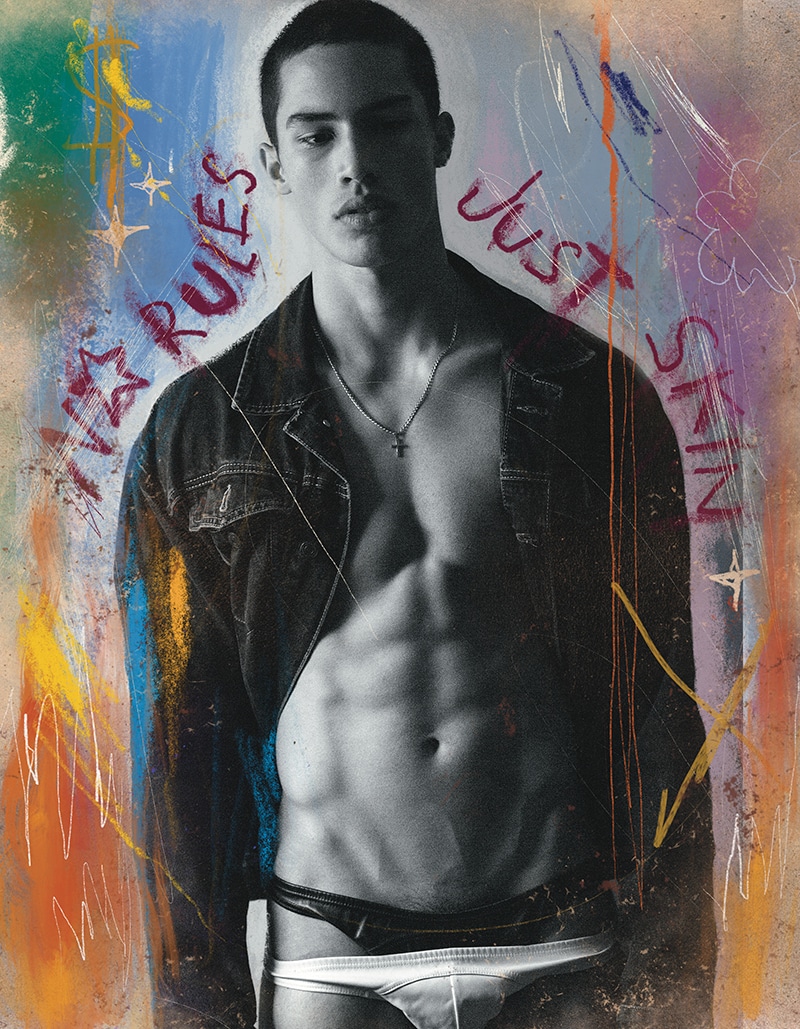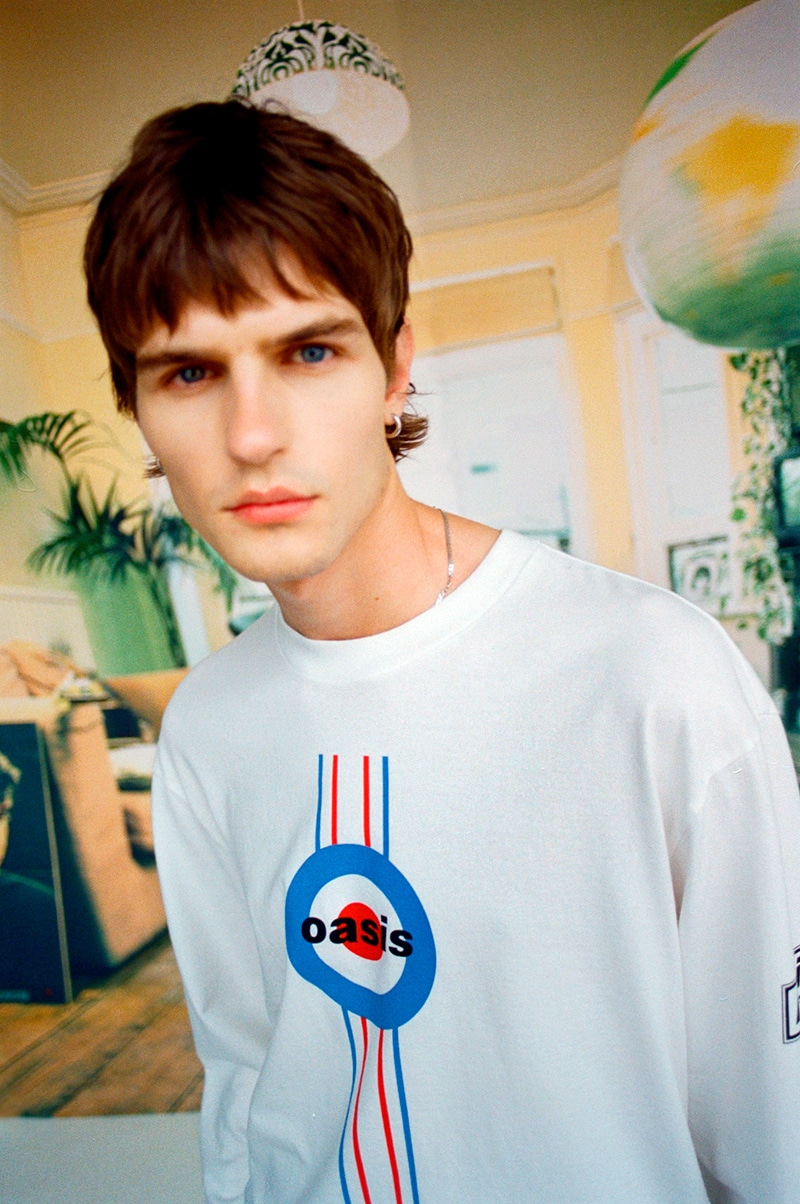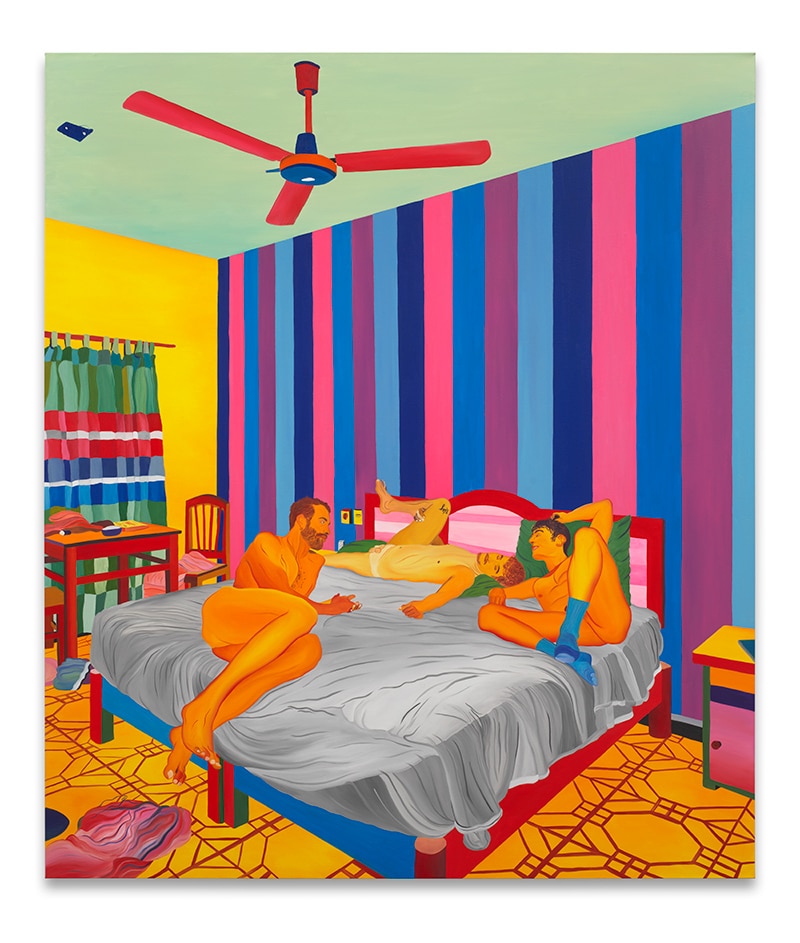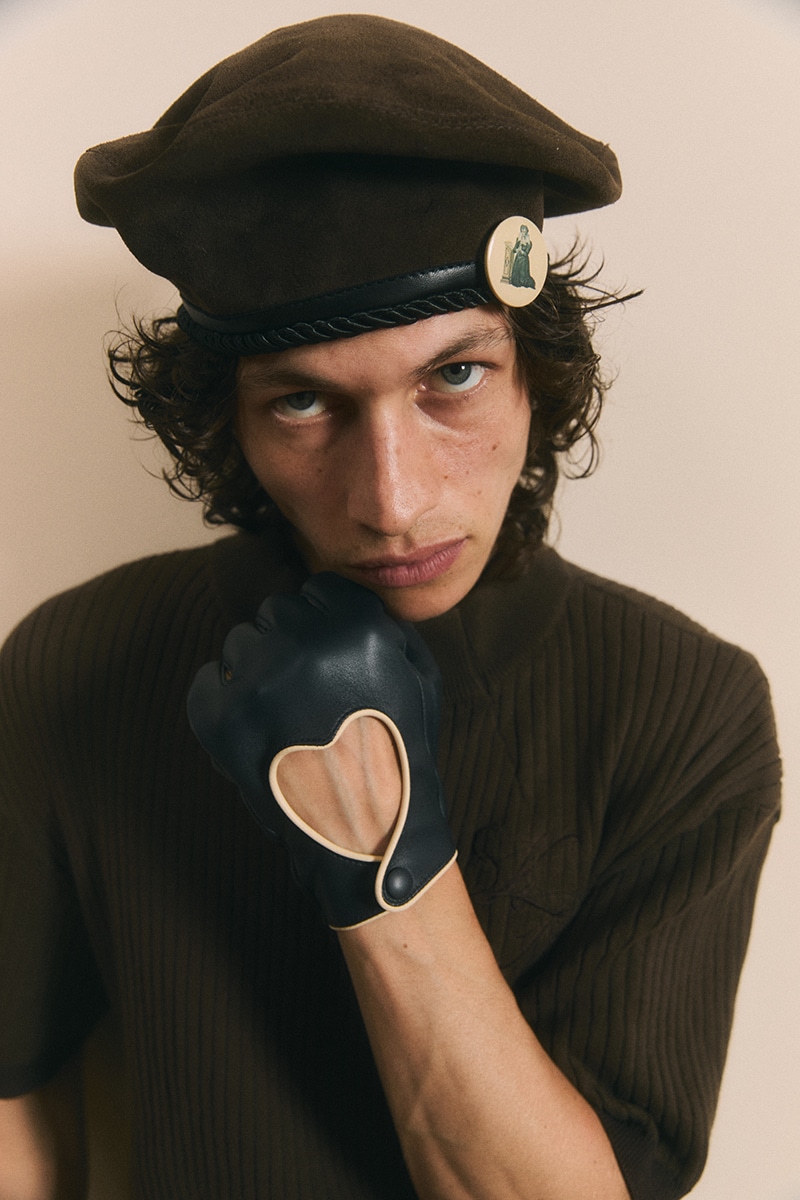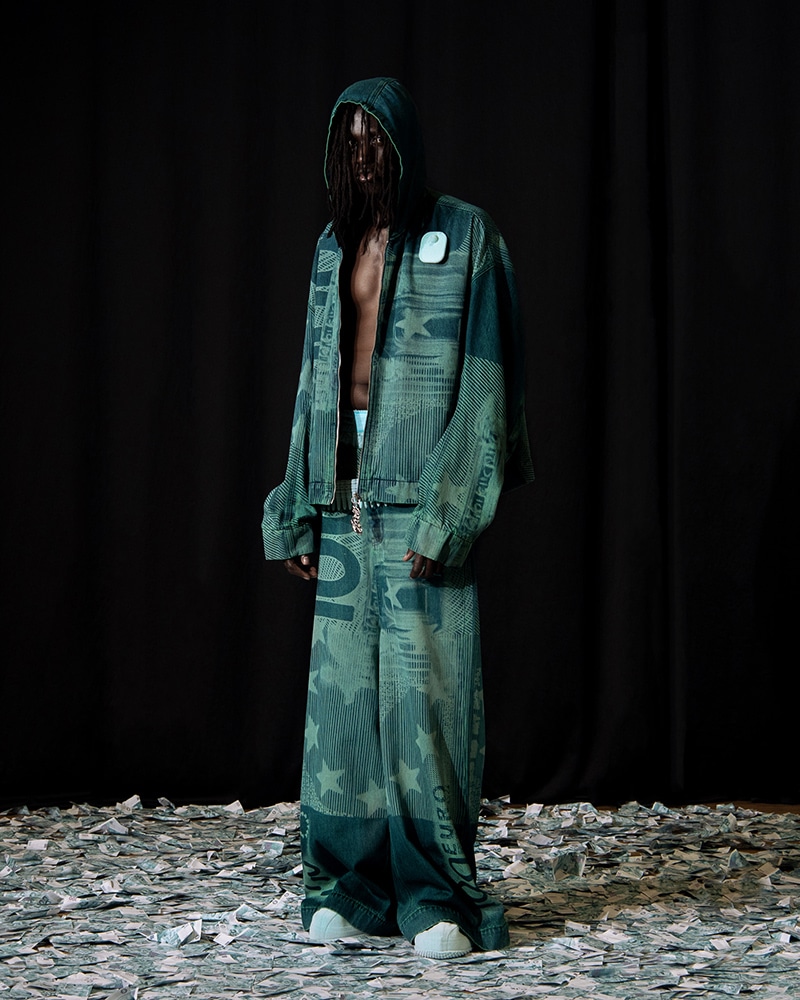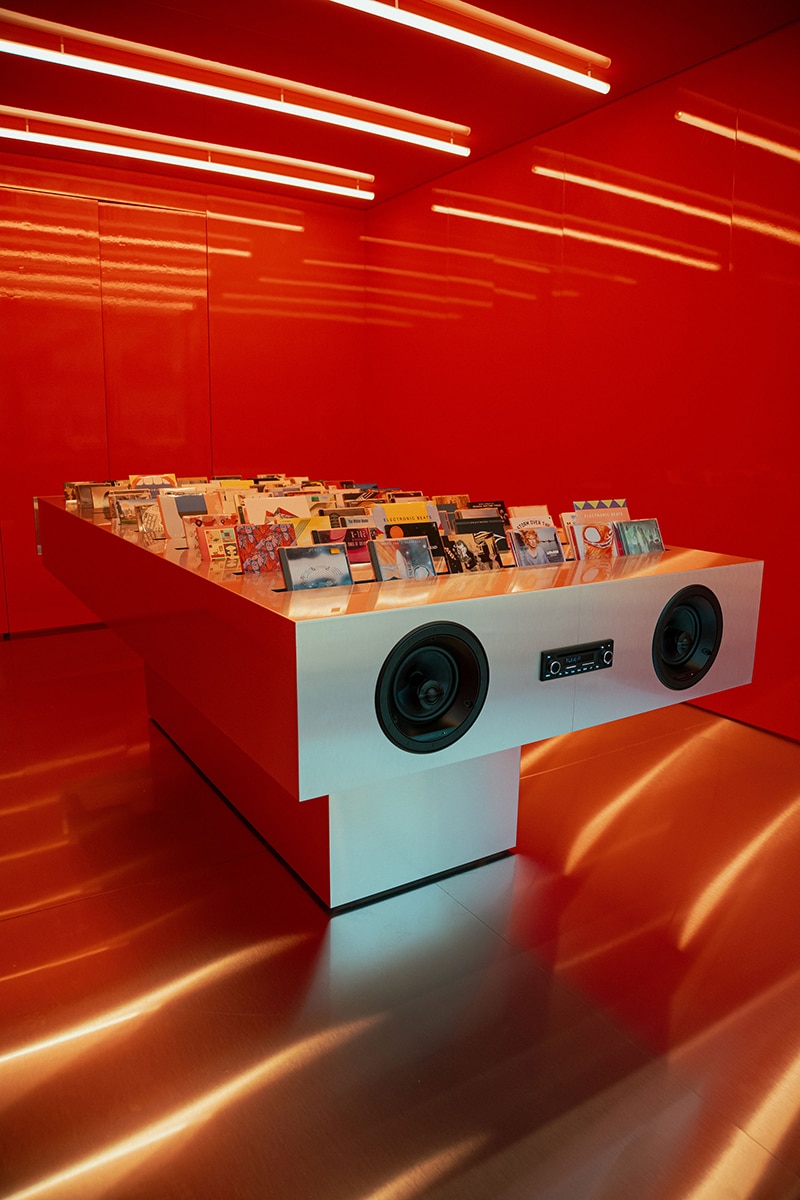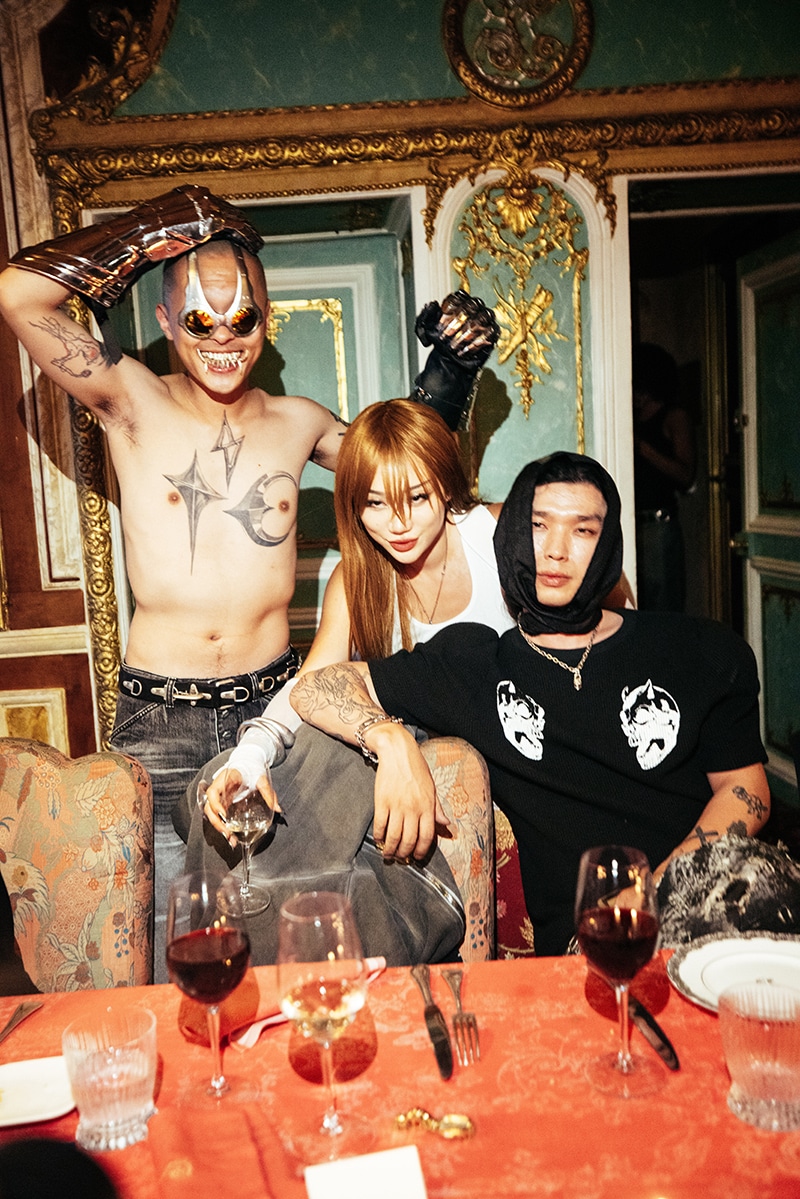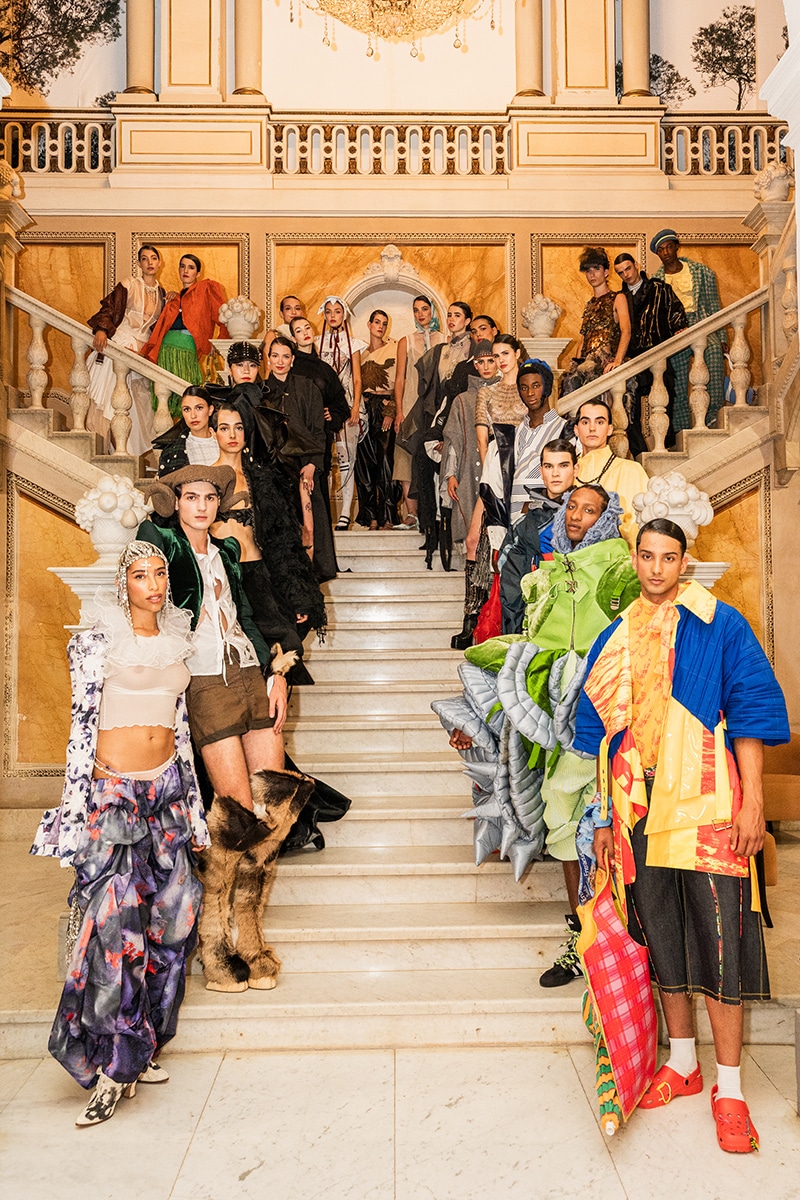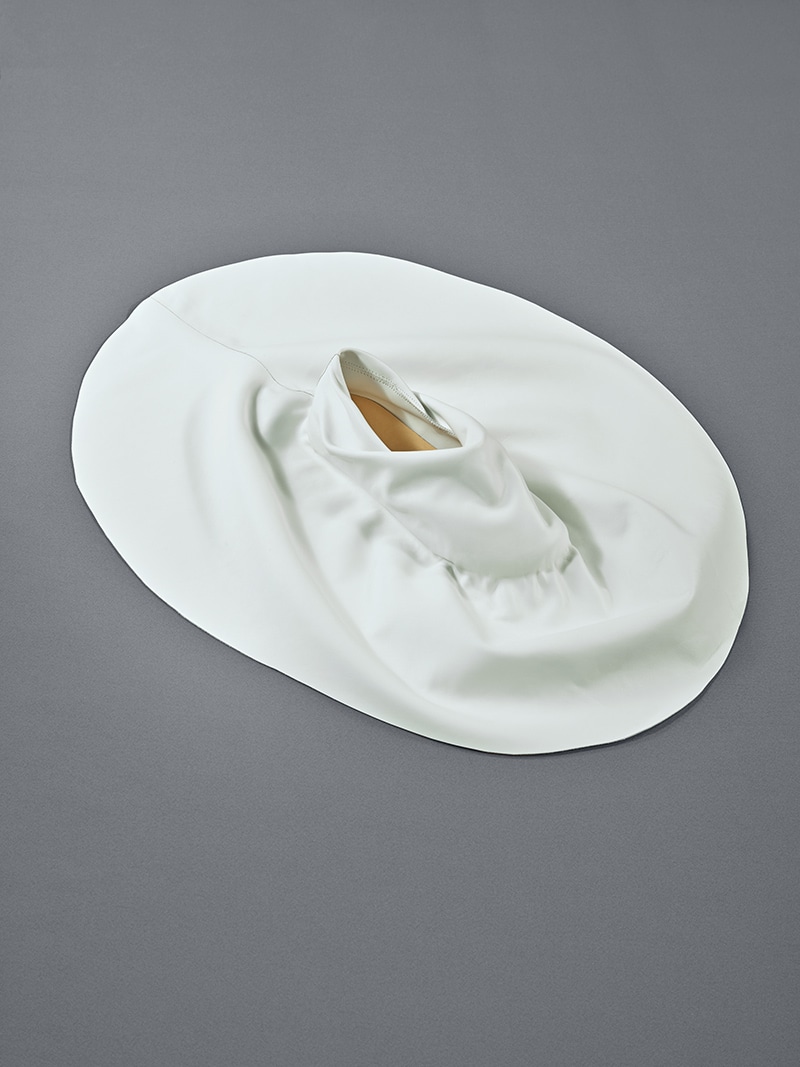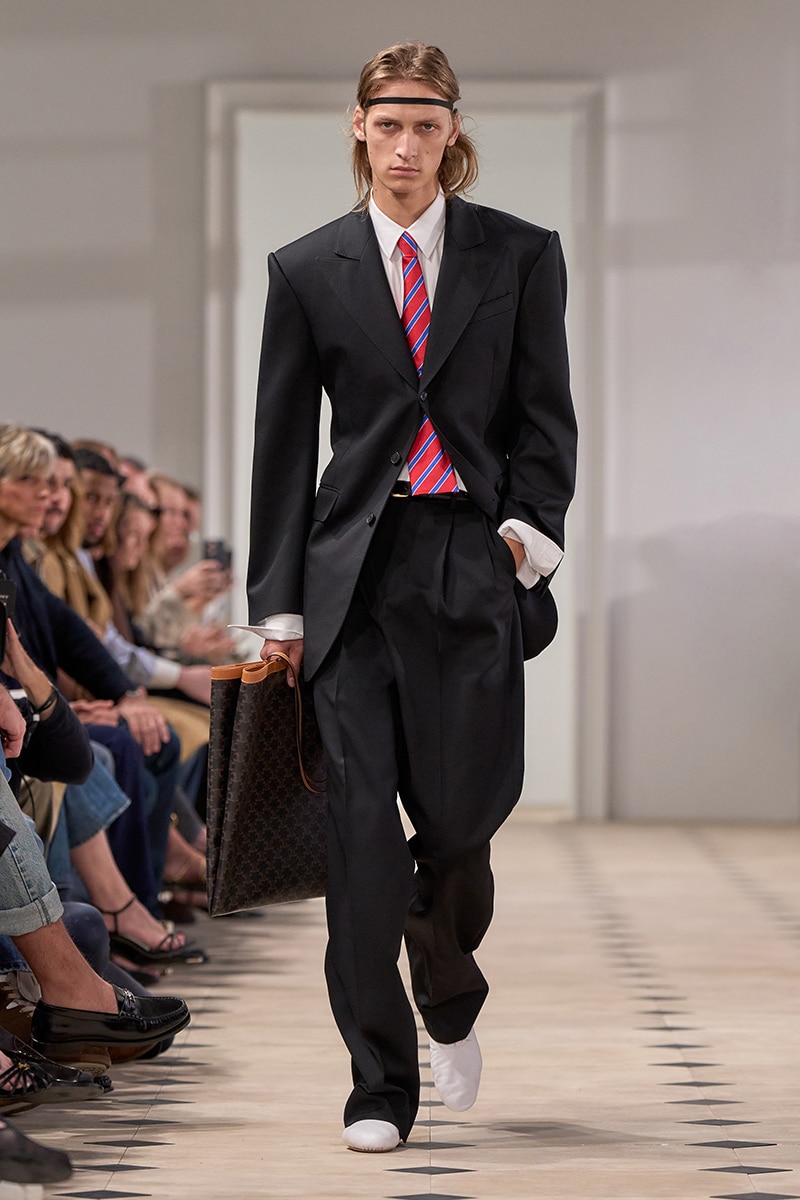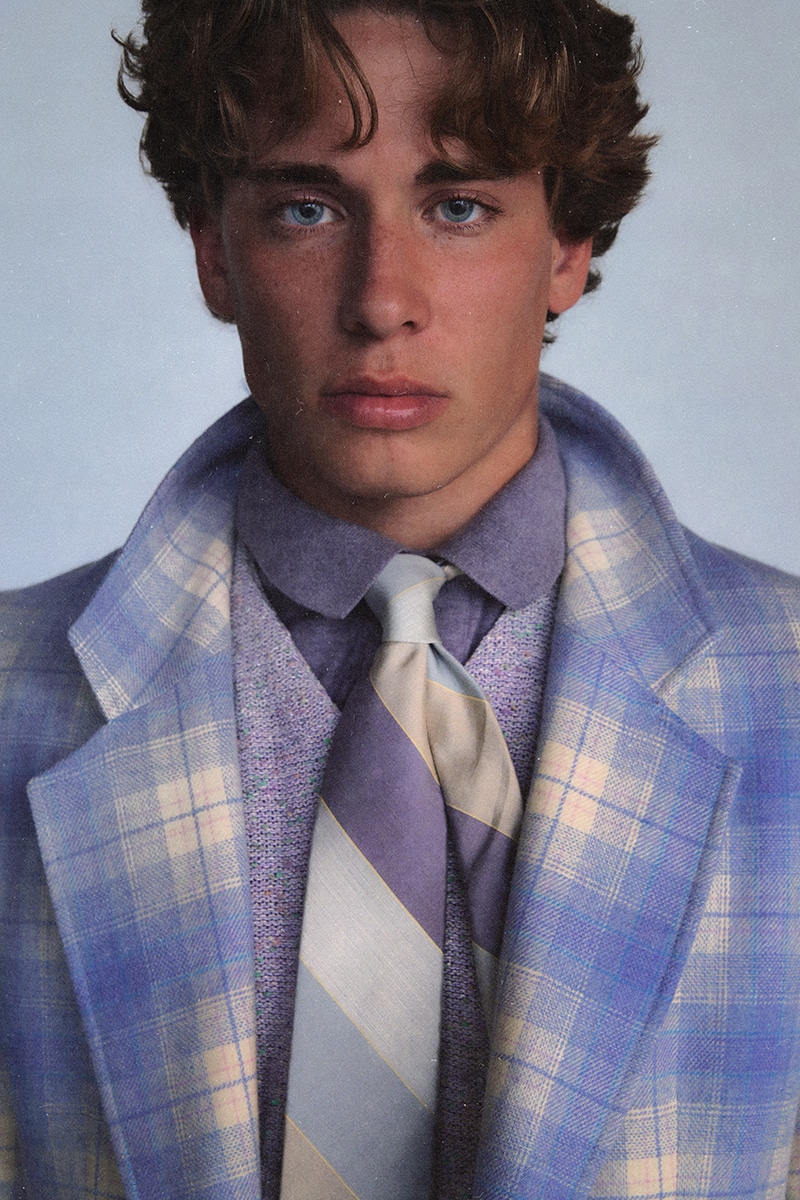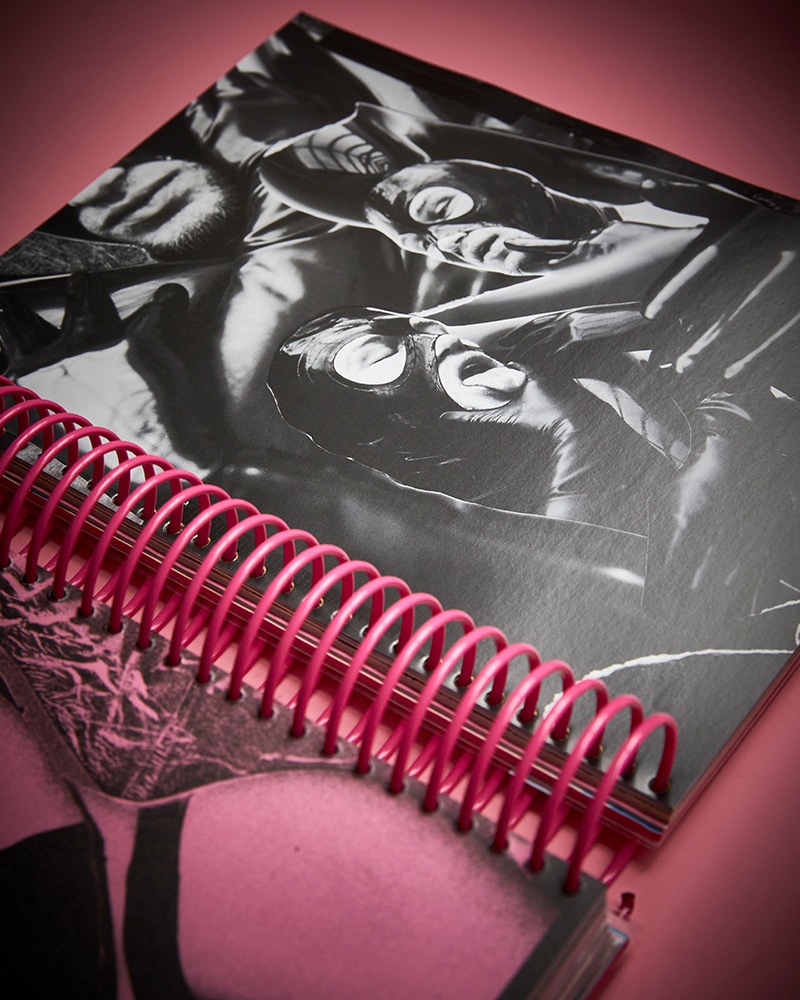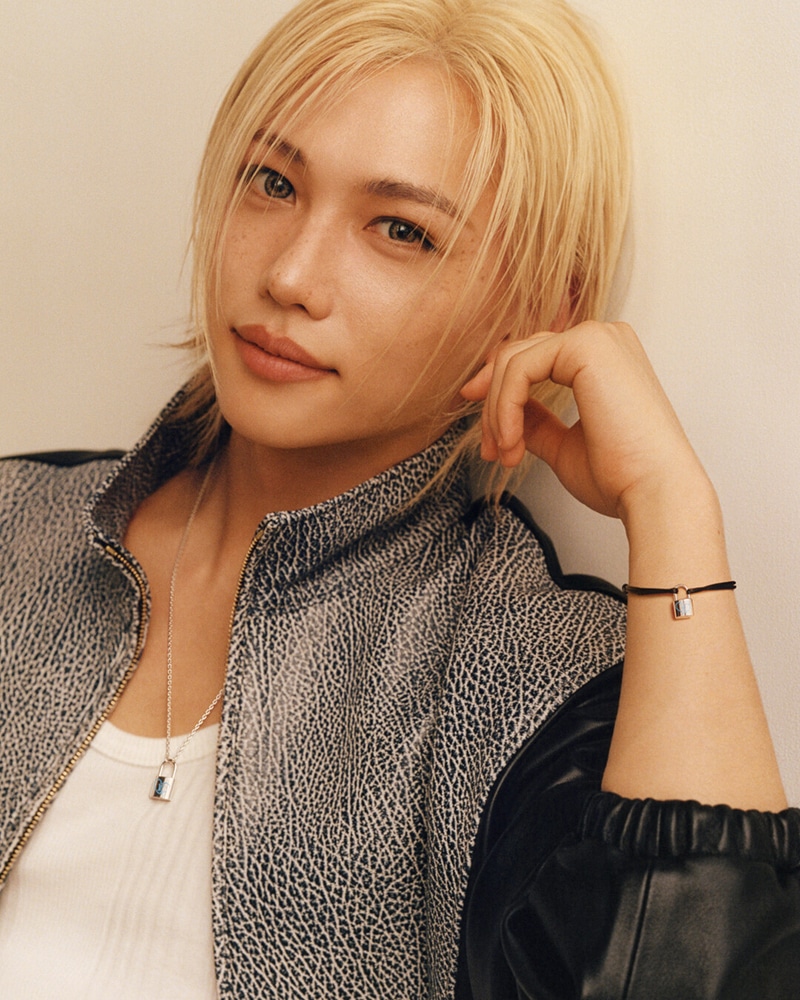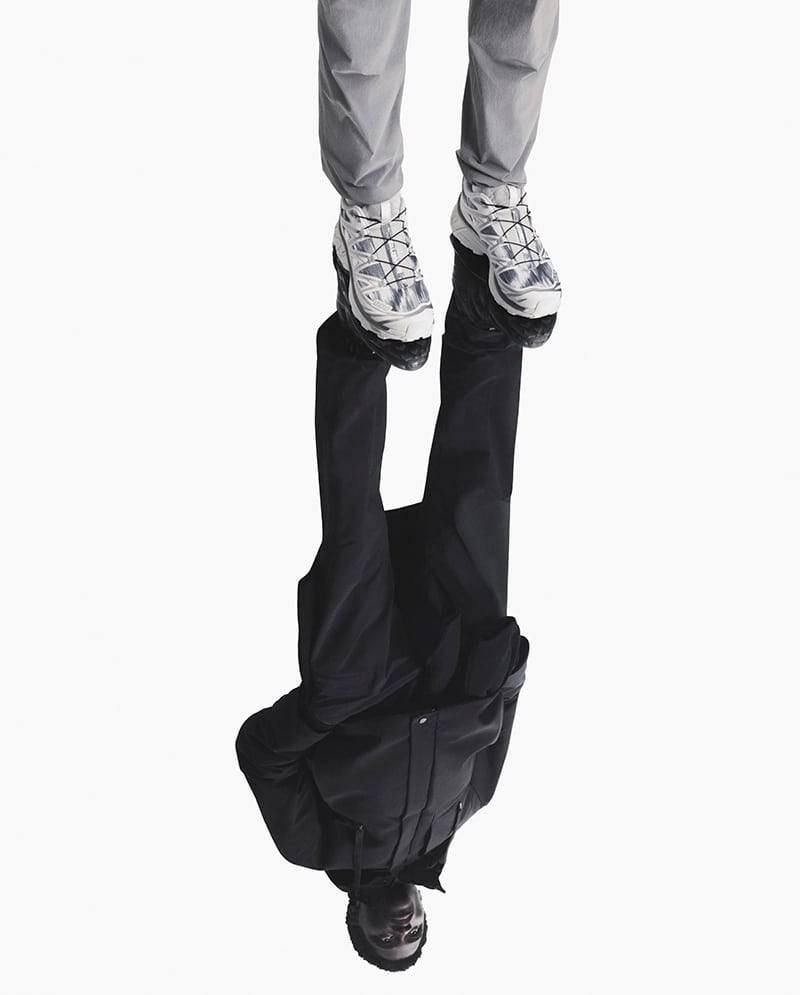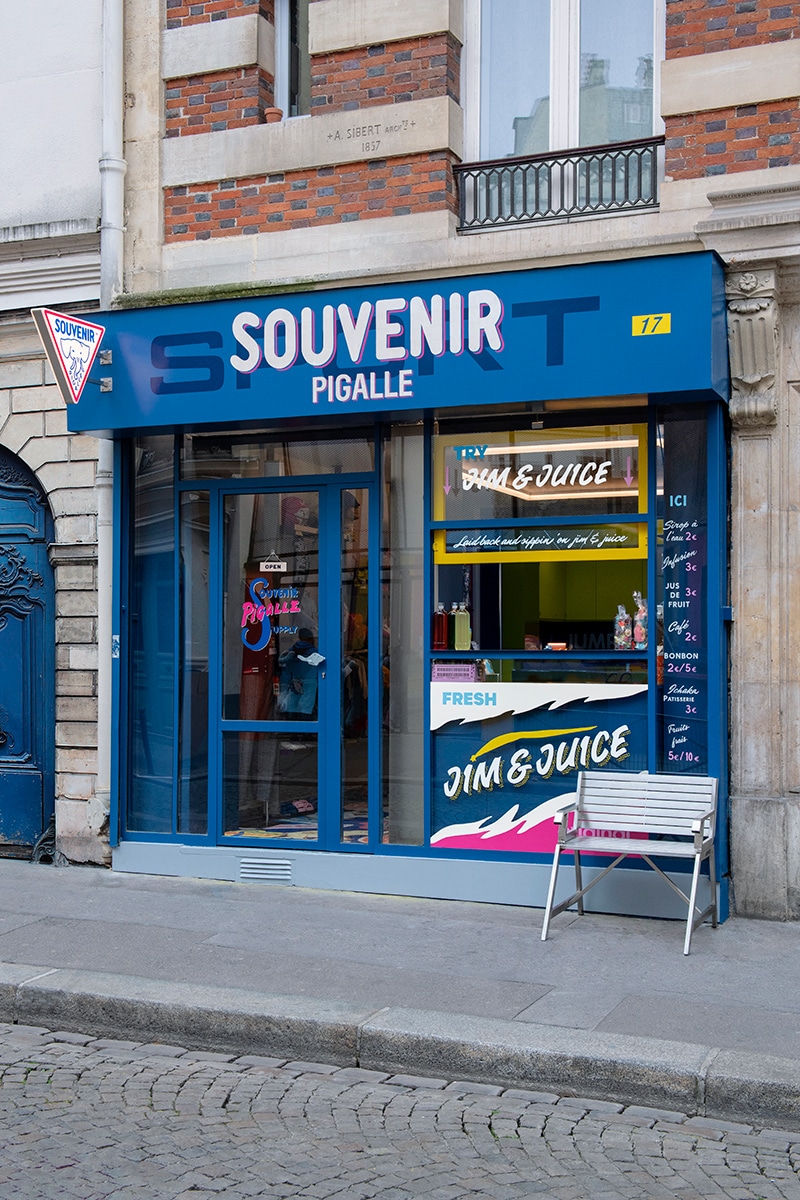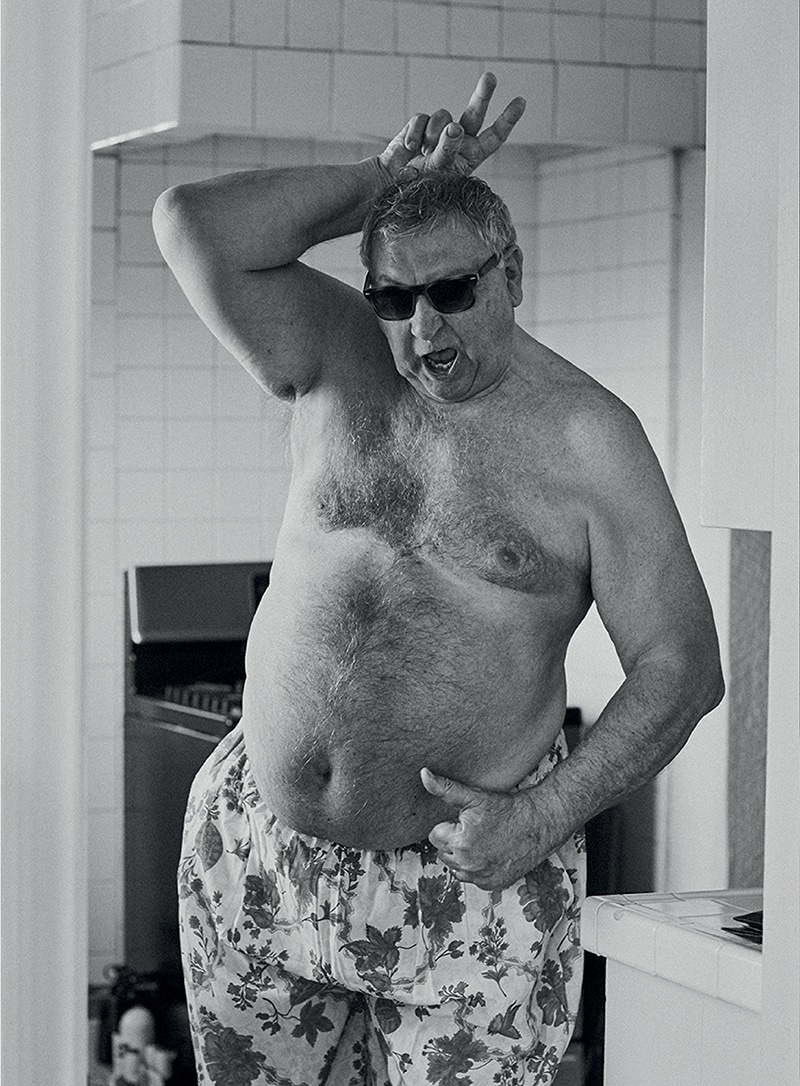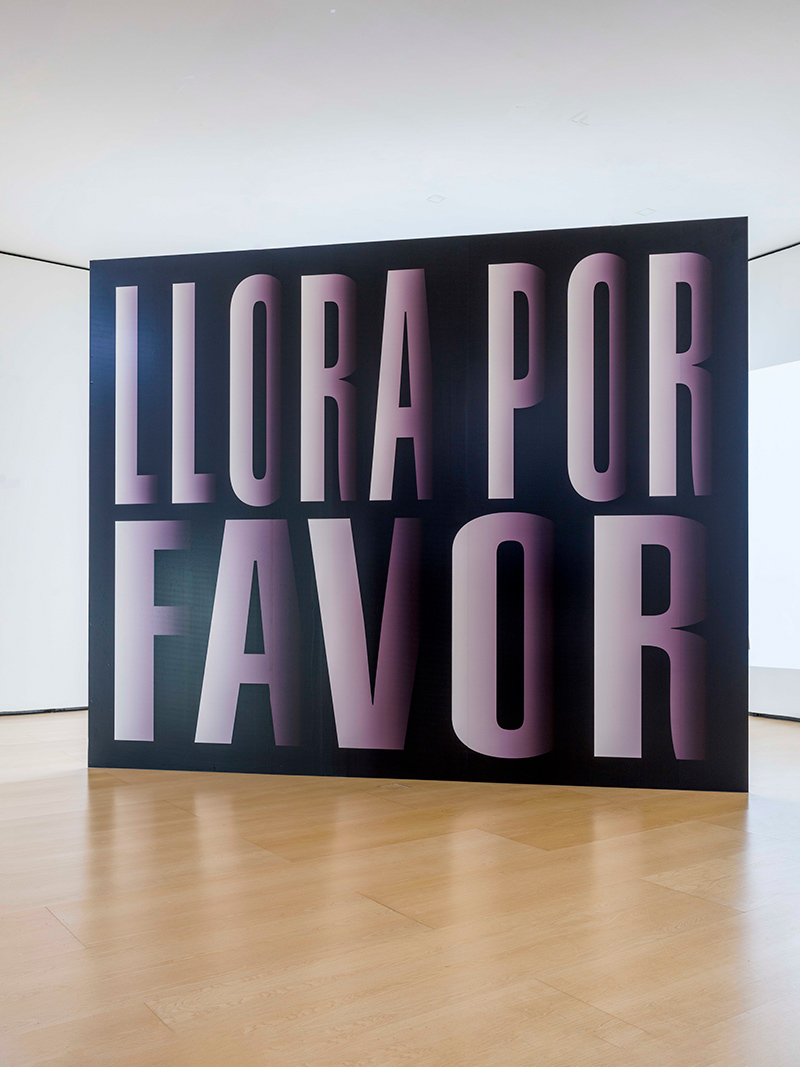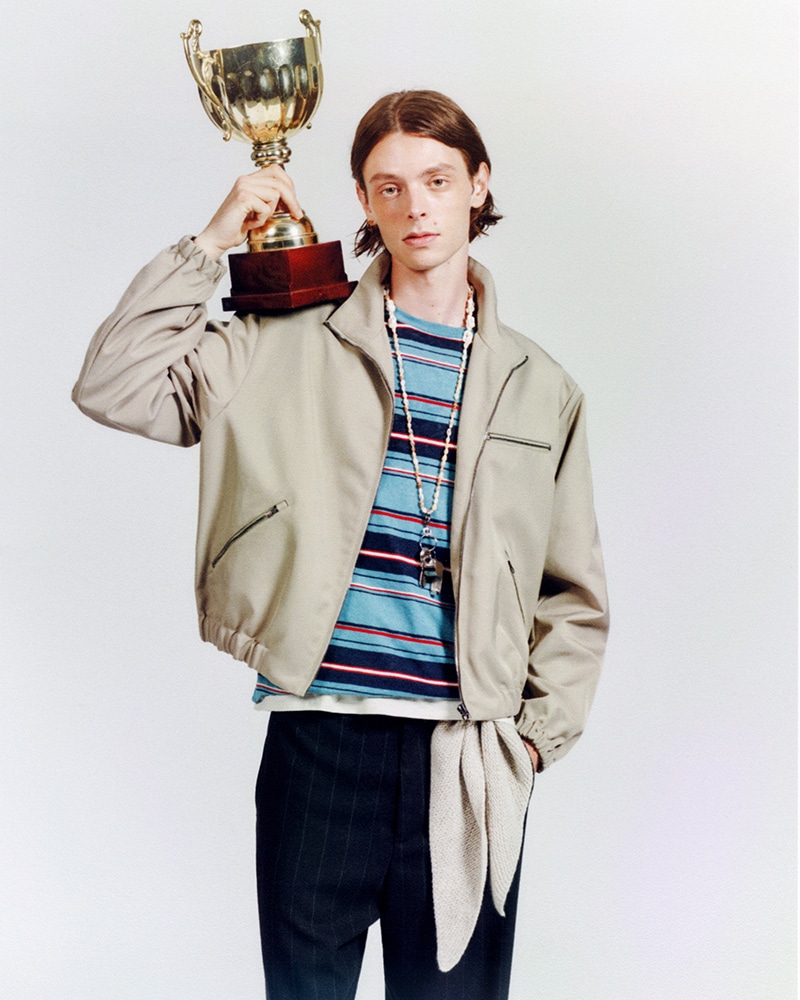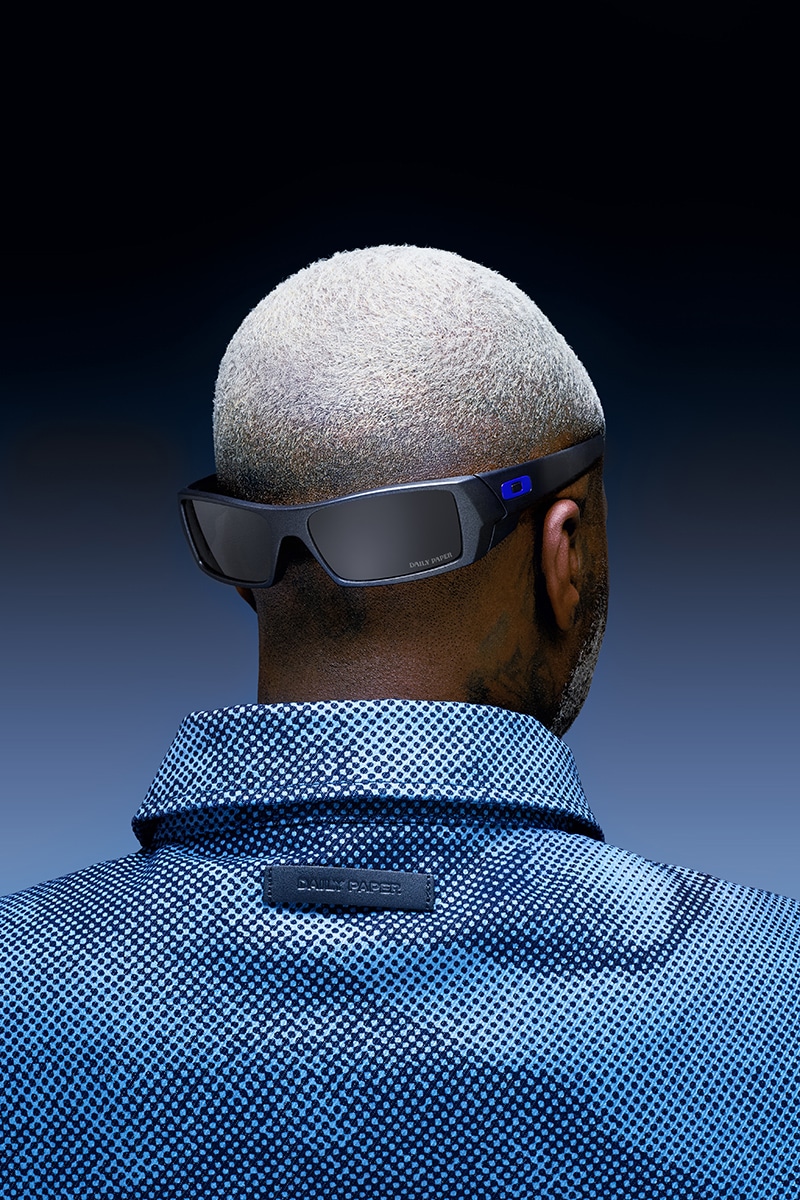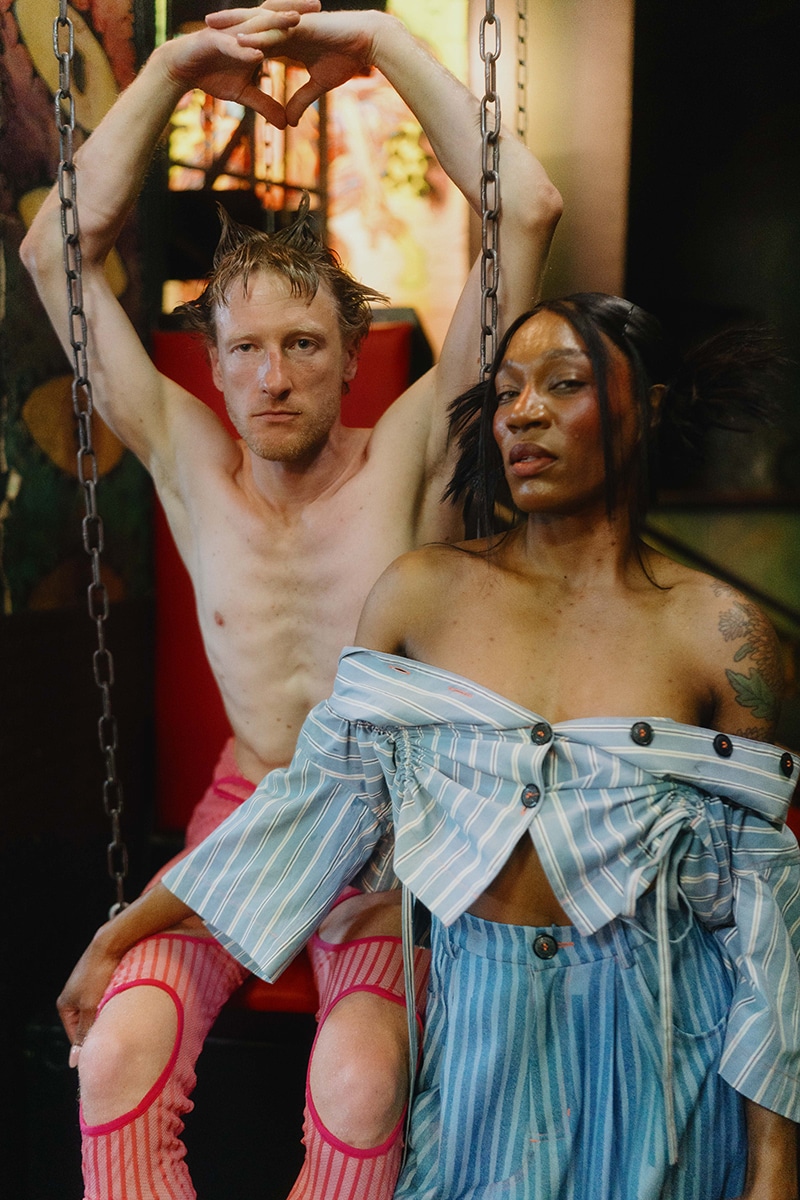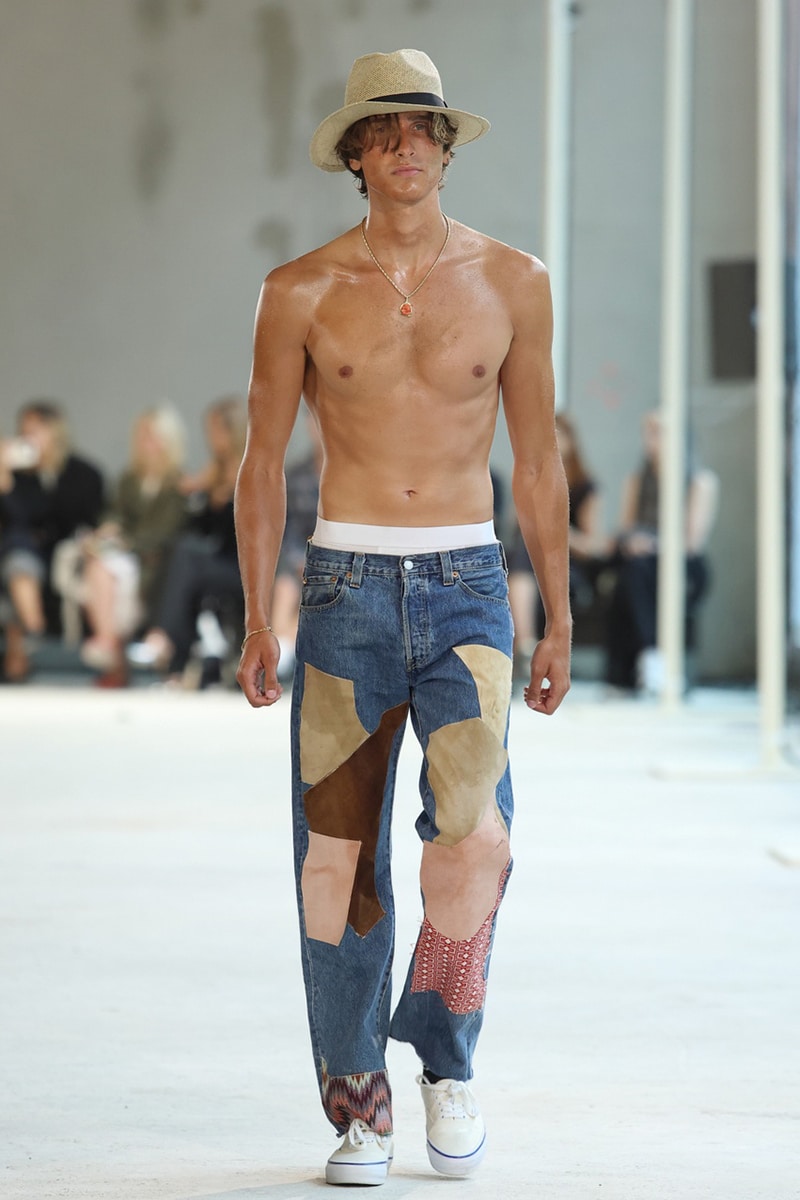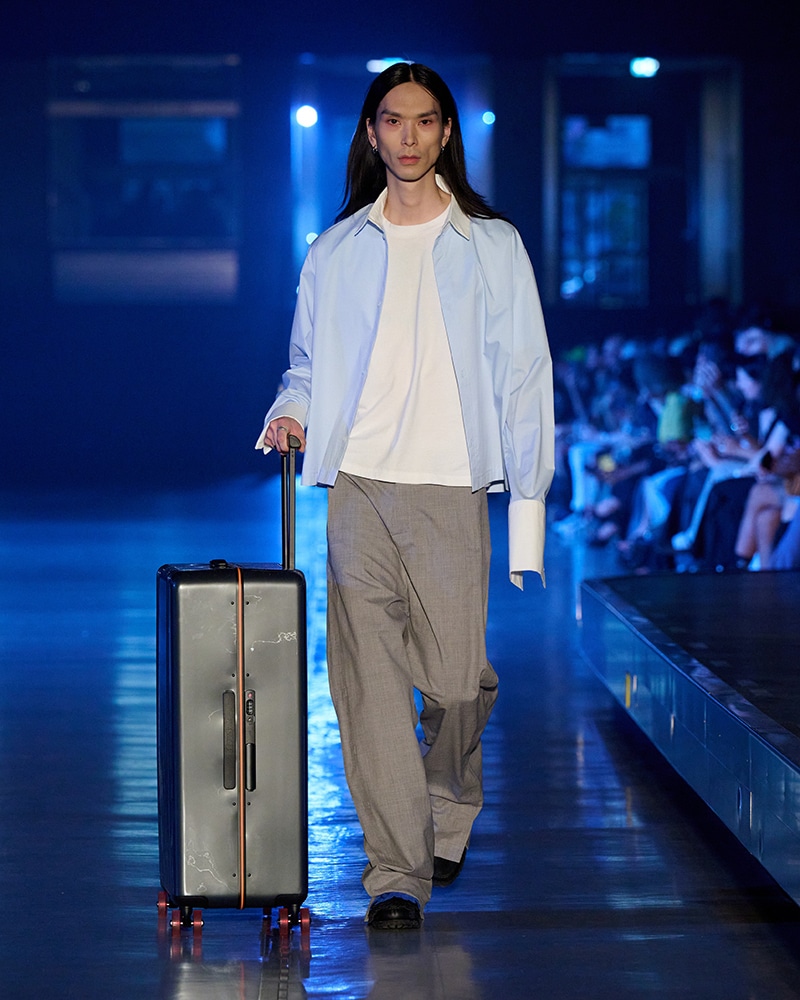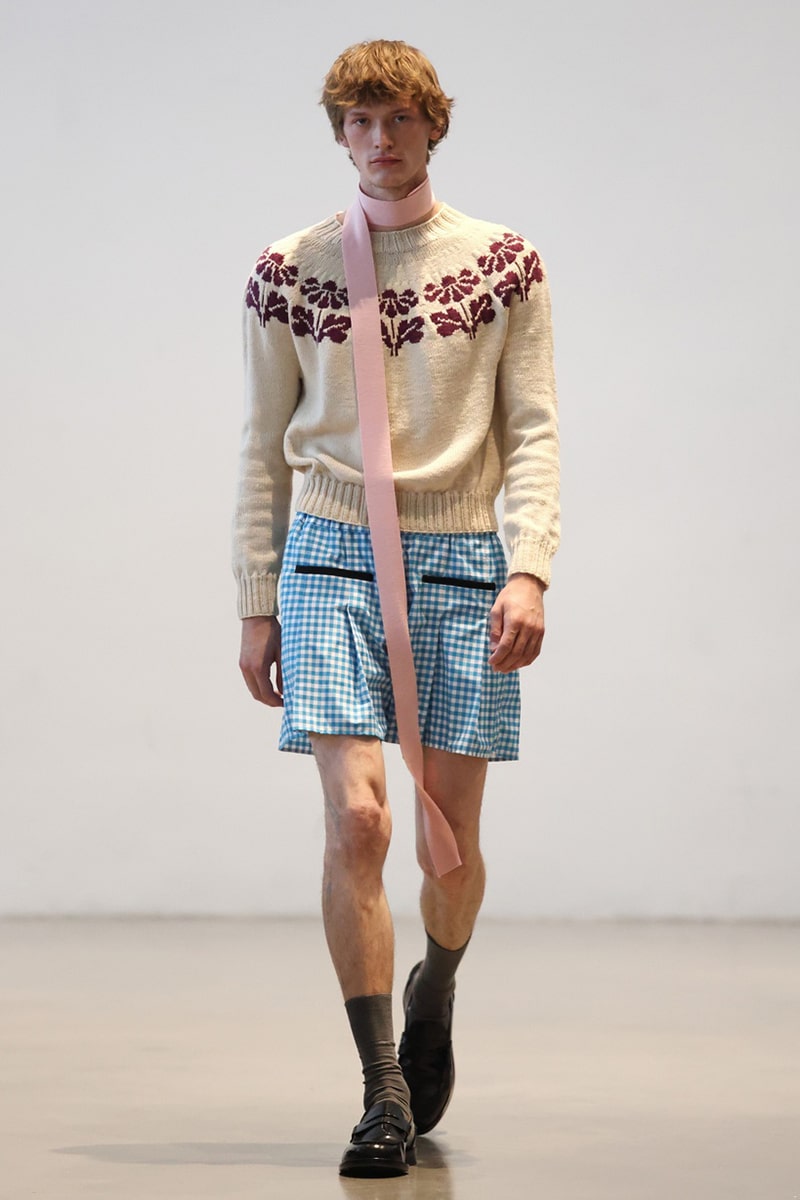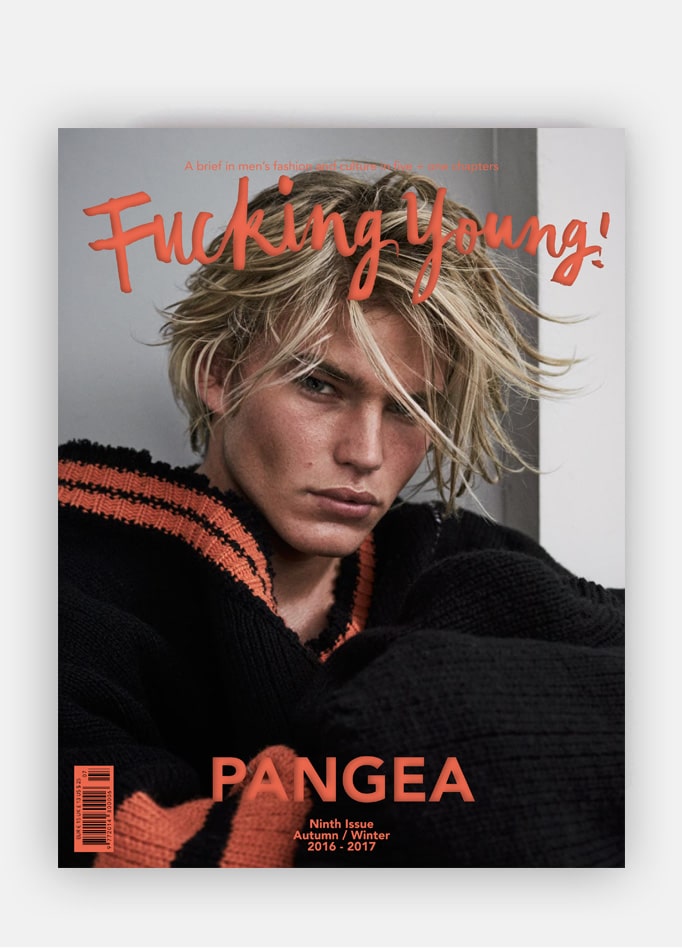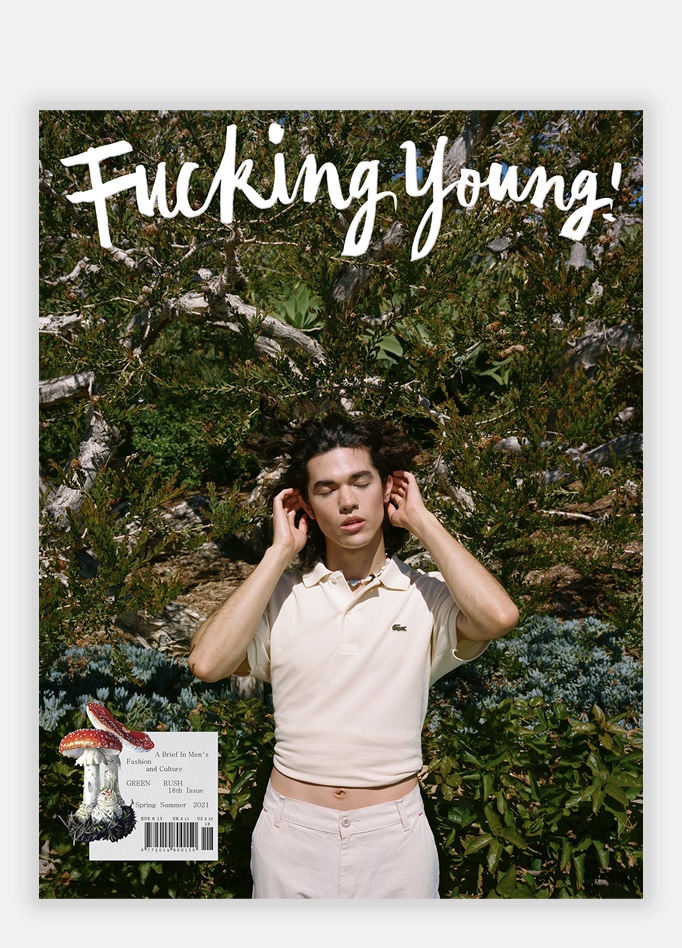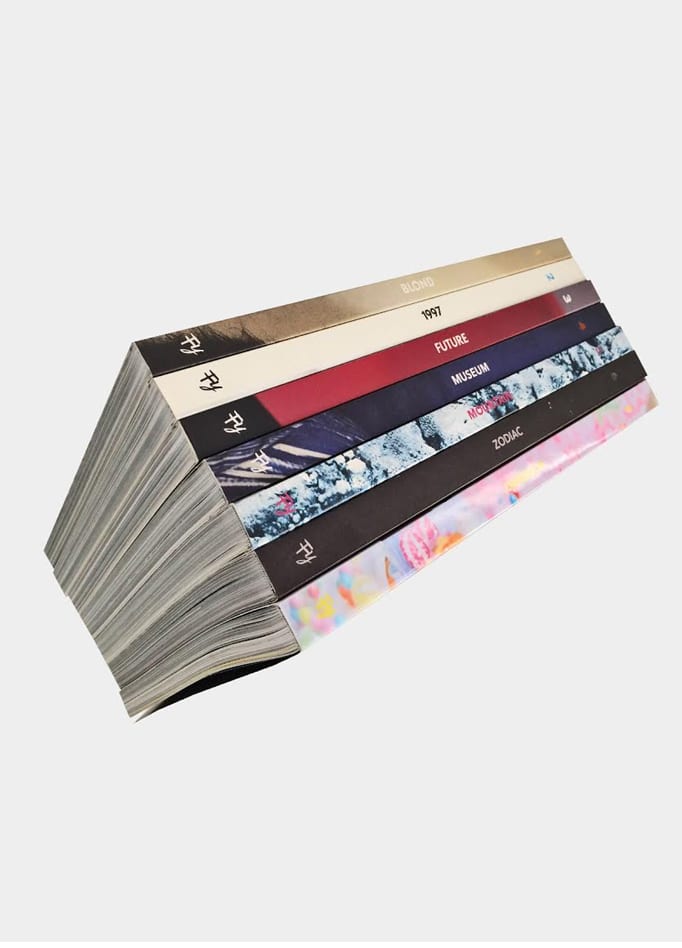Despite facing a deep-down hiatus of talent overload, some people are born to create their lane through something incredibly special. And as luck may want it, this is what I sense the moment I hit up conversation with Sam. Undeniably, the talent’s glorious Instagram gives us much to fawn over and admire, but he also reminds me that the nature of an independent artist is “factually 2% glamour.” Behind it, Salter is a real person with instinctive frustrations and a huge set of desires, making his practice even more applicable. We speak about the burden of retaining a strong social media presence, mull over the perplexities of masculinity in modern culture and engage in the poignant flow of society-caused stigmas. “[Identity] is being who you are authentic with no apologies. I’ve found somewhat of an identity, but I’m always working on it. I think a lot of us are. You grow, you change, you learn lessons, make mistakes, create memories, get inspired, get uninspired. And that, to me, is my identity ever-evolving” he comments. His dance vocation, for one, is certainly worth giving a fuck about. Describing his profession as an “idiom of expressivity”, he’s managed to fine-tune a balance between fashion and dance, which occasionally spun in strife. You’d be forgiven for thinking Sam’s catalog of uncertainties stretched to major feats, however, sometimes it isn’t all sunshine and light. Battles are there to be fought and challenges are there to be tested. Hailing from London recalls over his best career gigs, touching on a life dream that led to memorable outcomes.
The list is endless, and Sam Salter promises no hints of stopping. Rather, to continue simmering greatness. The last months armed a bolder soul and a clearer path, leaving no doubt that he’s ready to preach his own anthem in no time. Grasping a world of acceptance and willing to dump the curbs, we caught up with the artist and talked identity, early inspirations and riddled moments…
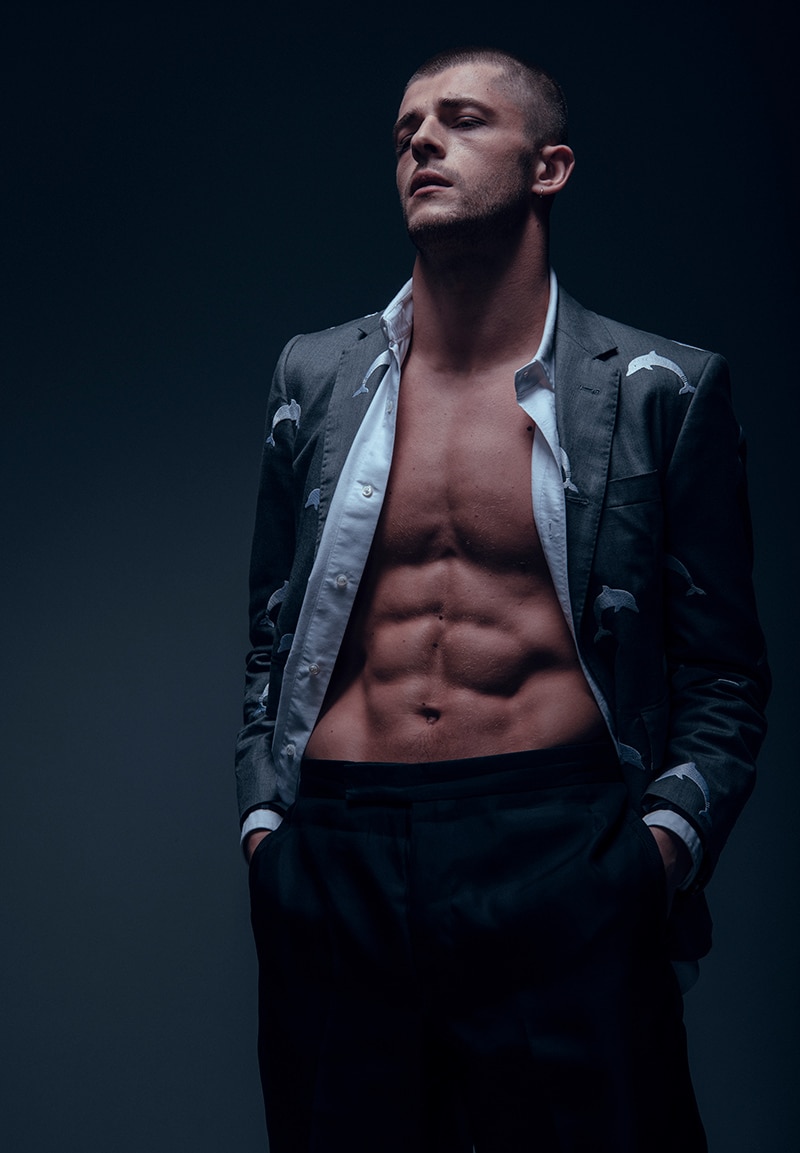
Hey Sam! How are you doing?
Hey hey, Fucking Young! I’m doing very well thank you.
Before we get deep-down on this, let’s begin it with the basics. Could you introduce yourself to us?
Sure thing! I’m Sam and I’m a 25-year-old dancer from Kent, now living in my favorite place in the world: London.
How would people describe you?
Creative with an edge of completely crazy – just asked my best friend that question so there it is! *laughs.
How did you venture into the fashion industry?
I fell into it really. Working freelance when I was not in shows led me to attend castings and book commercial work. I then started test shooting with fashion photographers, became really interested in the apparel side of things and started creating looks for myself on a daily basis. Subsequently, I got signed with my modeling agency last year, so it was all quite unexpected, but I love it. I’m getting more passionate about it as days go by.
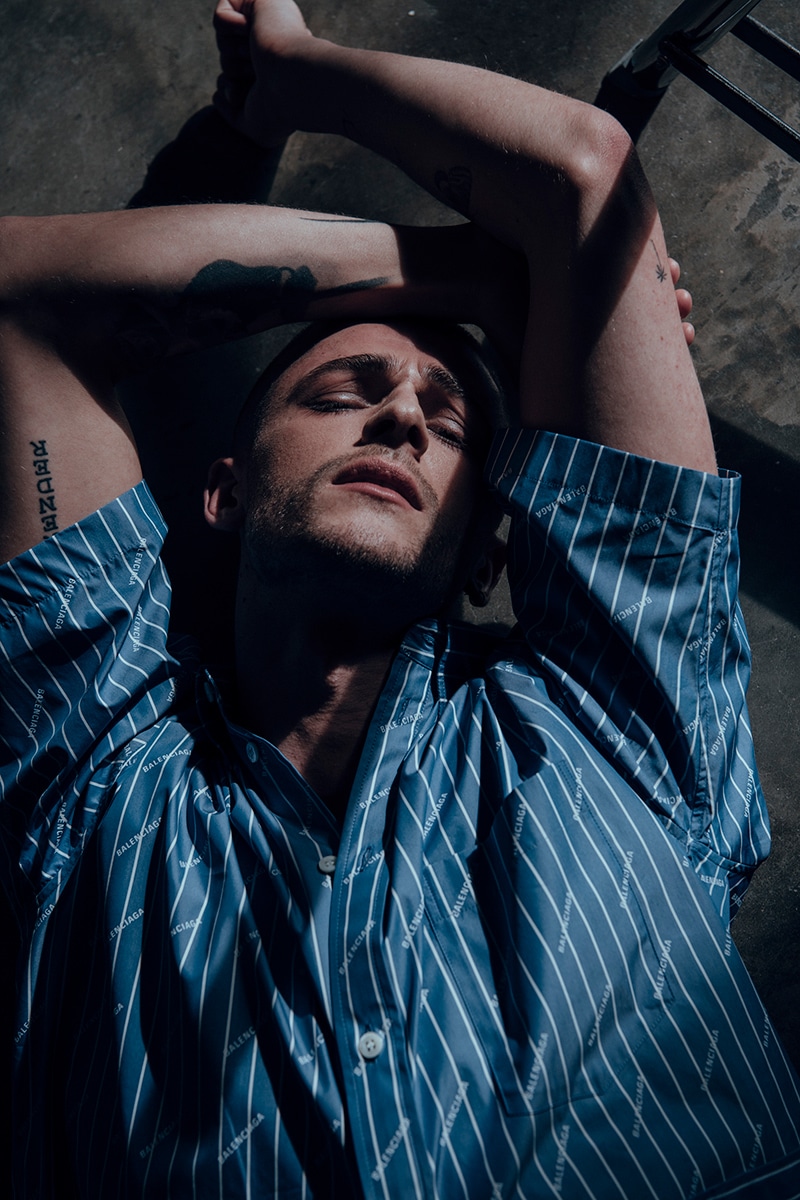
Woah, you’re also a ballet dancer. How did you kickstart your dance career?
By enjoying attention from girls and dance mums that watched my dance classes. I loved dancing the minute I stepped into the studio. I felt like I belonged somewhere, I felt like it all came naturally to me, and I worked my arse off and realized I could actually turn it into a career.
Do you feel fashion and dance come as a delicious concoction you utilize to share your views?
Fashion and dance fit really well for me. They’re expression. I’ve always felt that they go hand in hand, and I think fashion brands are using dance more and more which is so exciting to see.
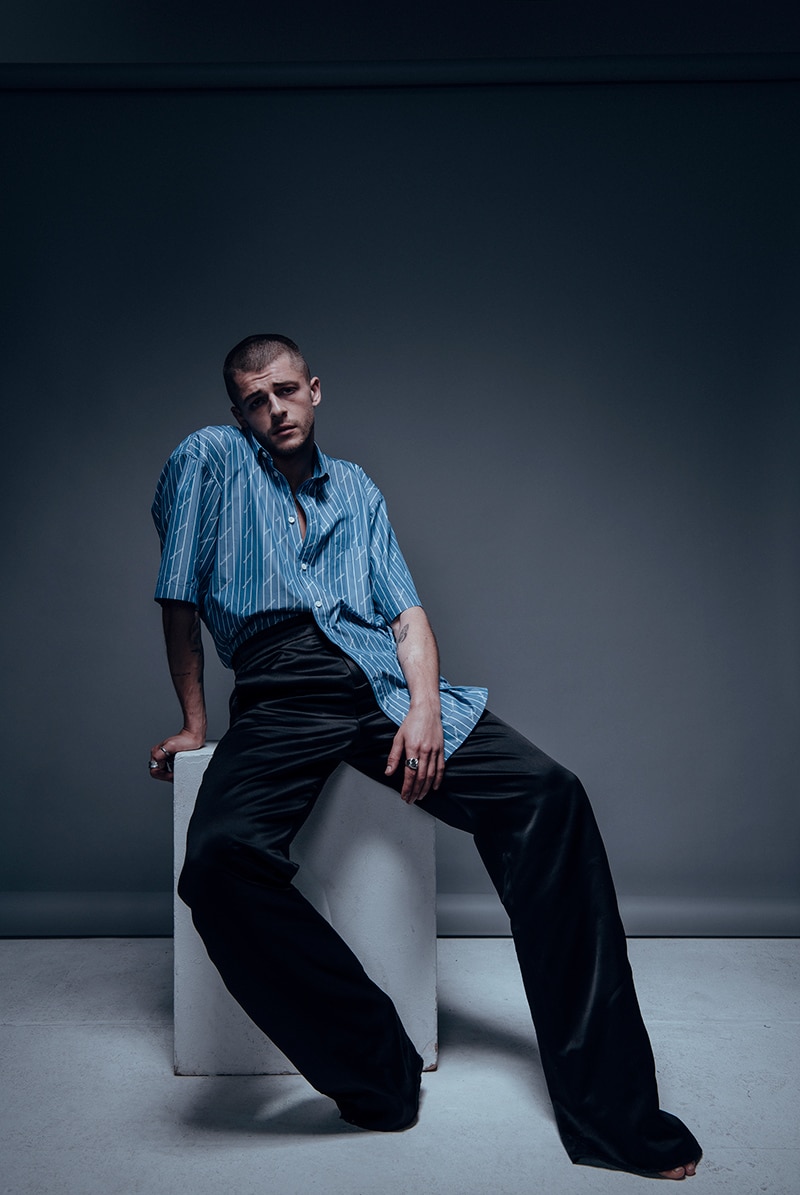
What does identity mean to you?
It’s being who you are authentically with no apologies. I’ve found somewhat of an identity, but I’m always working on it. I think a lot of us are. You grow, you change, you learn lessons, make mistakes, create memories, get inspired, get uninspired – and that, to me, is my identity ever-evolving.
But most importantly, what does the dance world mean to you?
I love dancing. Dancing was and is my first love, my ultimate passion. I love being so passionate about something. And to make a living from (basically) moving my body, it’s a dream come true. It’s all I wanted to do since I was nine.
The industry is tough, it’s short-lived, shallow, often unfair – you’re in pain, your body feels double what it actually is (I feel 50 years old sometimes) but when it’s your passion, you book that amazing job, travel the world, performing to tens of thousands every week – it’s always worth every blister, fracture and whatever else.
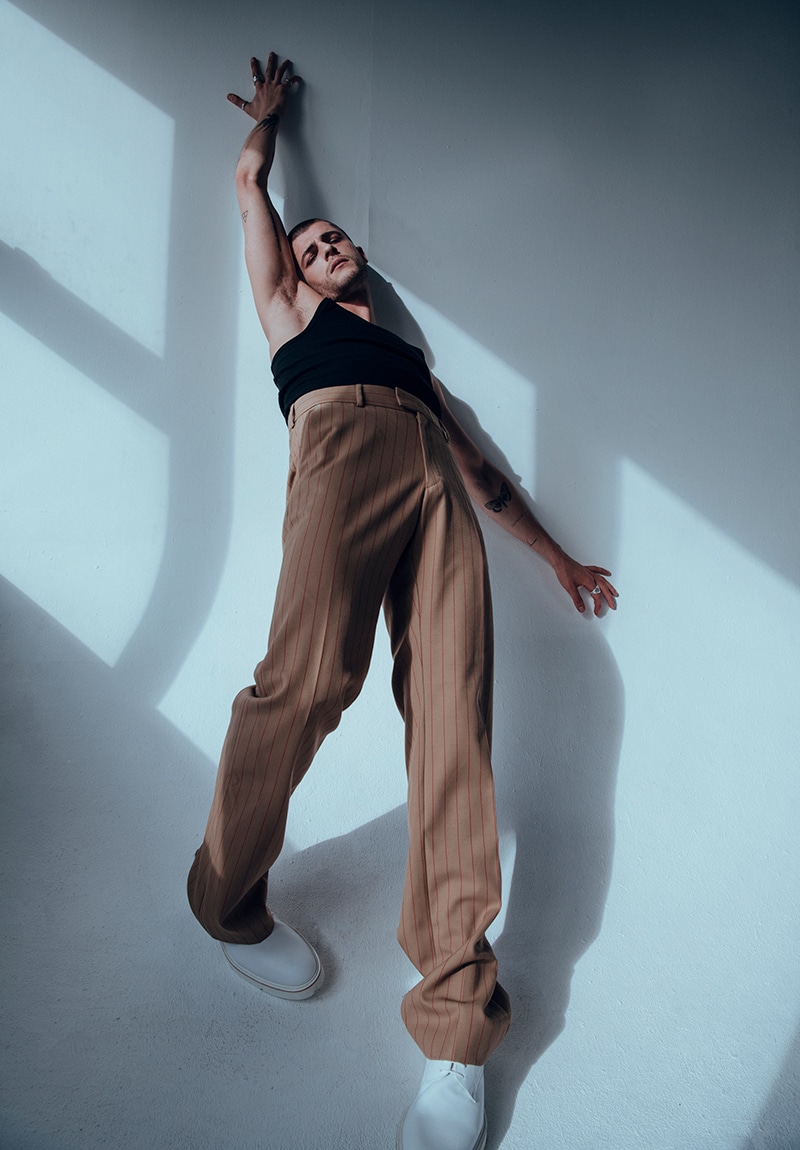
Masculinity and gender-normalization must play a vital role in your life, as the la-la-land of dance mirrors a reality imbued by expressivity. How have you tackled the concept of masculinity throughout your experience in the art world and where are you hoping to further such conversation in years to come?
When I first started working, we were told ‘men should dance like men’ – how does that make me feel now? Well, I’d like to question the why too. I suppose it’s circumstances, if the client wants a masculine dancer, you need to be masculine, that’s just the way it is. If they want men to dance with a feminine edge, then that’s what you’ve got to do. In this industry, it’s important to adjust accordingly. Personally, I love the mix of masculine + feminine on a man and woman, it’s interesting, it’s free, it’s being whatever you want.
What’s your take on mental health and how does it influence your practice?
I started taking care of my mental health when I first got sober in the summer of 2017. I suffered from the disease of addiction and it’s a daily battle. As I write this, I am exactly 11 months clean which is a miracle. Before I had a slip last year, I had 18 months clean – so altogether I’ve been sobering a fairly long time.
I connect to people who are like me, I take time out when I can, I write a daily gratitude list of ten things I’m grateful for. I attend a recovery program 3/4 times a week, I pick up the phone, I ring people, I work the twelve steps of recovery daily (or at least try to) – I take it very seriously.
Have collective stigmas ever hindered you along your self-discovery process of becoming a dancer?
Of course, I kept my dancing a secret when I was younger, there was a lot of fear around bullying, though my older sister was popular at school, so I think I was fine because she’d go for them otherwise.
The stigma of “male dancers are gay” hindered my coming out process, because as a fifteen-year-old – no, I didn’t want to be gay. Because of that stigma following me around. So, coming out was a slow process. It was tricky to come to terms with it.
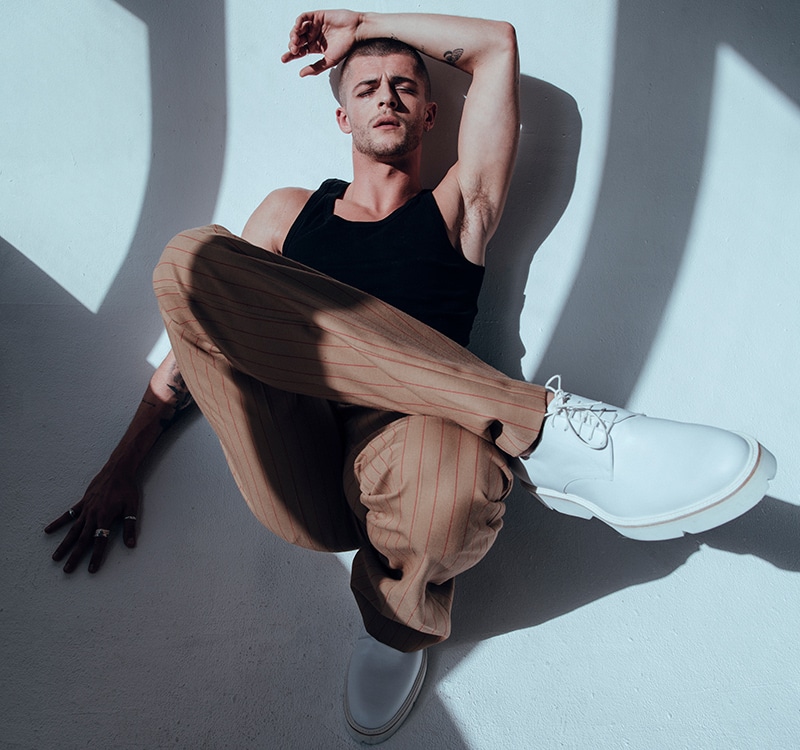
Now onto a deep one: do you strive for perfection in your world?
Too much. I have to remind myself constantly that perfection isn’t really a thing; there’s no such thing as perfect to me. So, I’m striving for something that isn’t really real. I remind myself I can only be the best I can be, work hard, be humble, be kind. For today only. That’s enough for me.
Favourite experience thus far? Please, narrate.
Dancing a solo at the Special Olympics in Abu Dhabi for Nicole Scherzinger in a stadium – that was just sick.
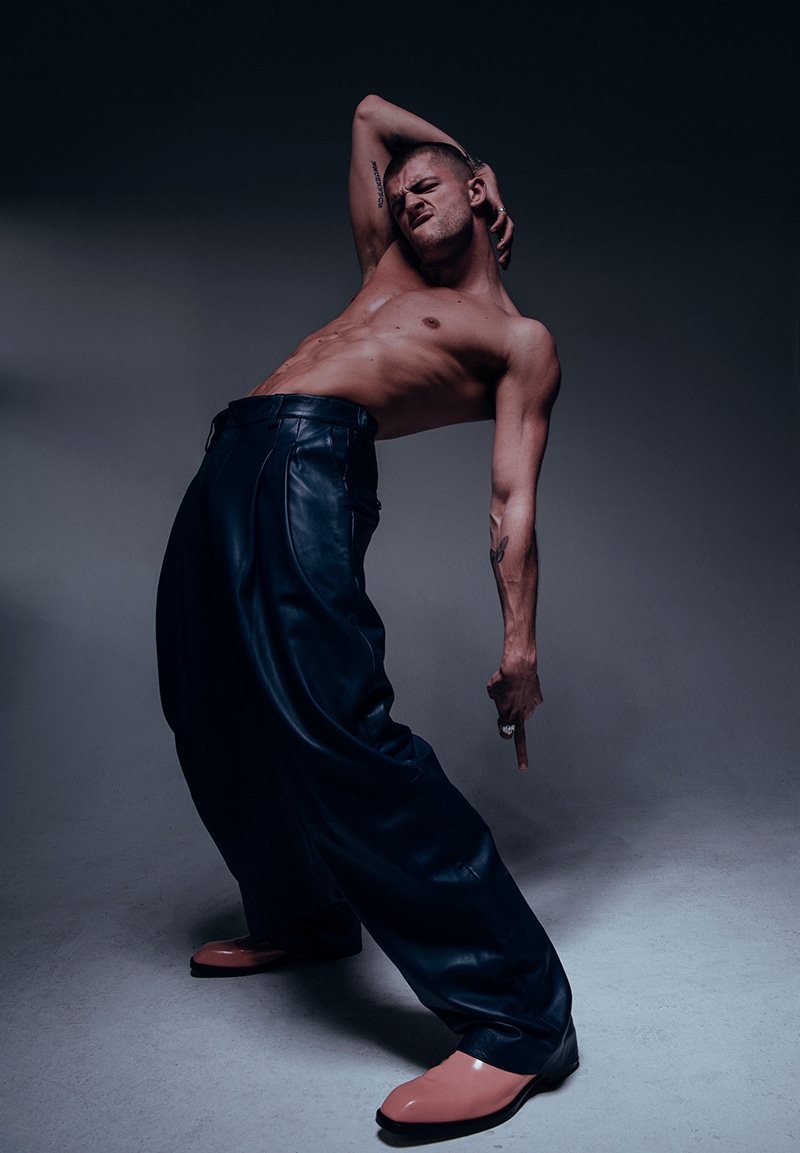
Has education been an imperative cornerstone in your practice?
Totally, although I didn’t always see it at the time. When I was young and naive, education taught me about my craft, yes, but life skills also. I learned a lot on the job also, however, I think education can teach you so much and prepare you. Ultimately, when you really learn certain skills you can’t get taught in training it comes down to the job.
How’s it been for you since the start of your journey? Did you encounter any major hindrances when you first started out in fashion?
The main hindrance was working full time in a show, I’d get castings through, availability checks and more. The main thing was that I was always in a different part of the country/world when the jobs would be shooting, and often it would overlap with a day or even a few hours. I thank my agency for their patience with that, it was often frustrating.
Saying that I did still manage to work when we could make it work. I shot the cover of Attitude in Portugal in the space of two days, in between touring venues. I finished the show in Kingston Upon Hull Saturday night, at 10:30 p.m. – drove straight to Gatwick airport, got a 5 a.m. flight to Madeira, shot for Attitude on Sunday and Monday, flew back Tuesday morning, ready for company ballet class at 12:15 p.m. I did two shows that day. It can happen and I made it happen.
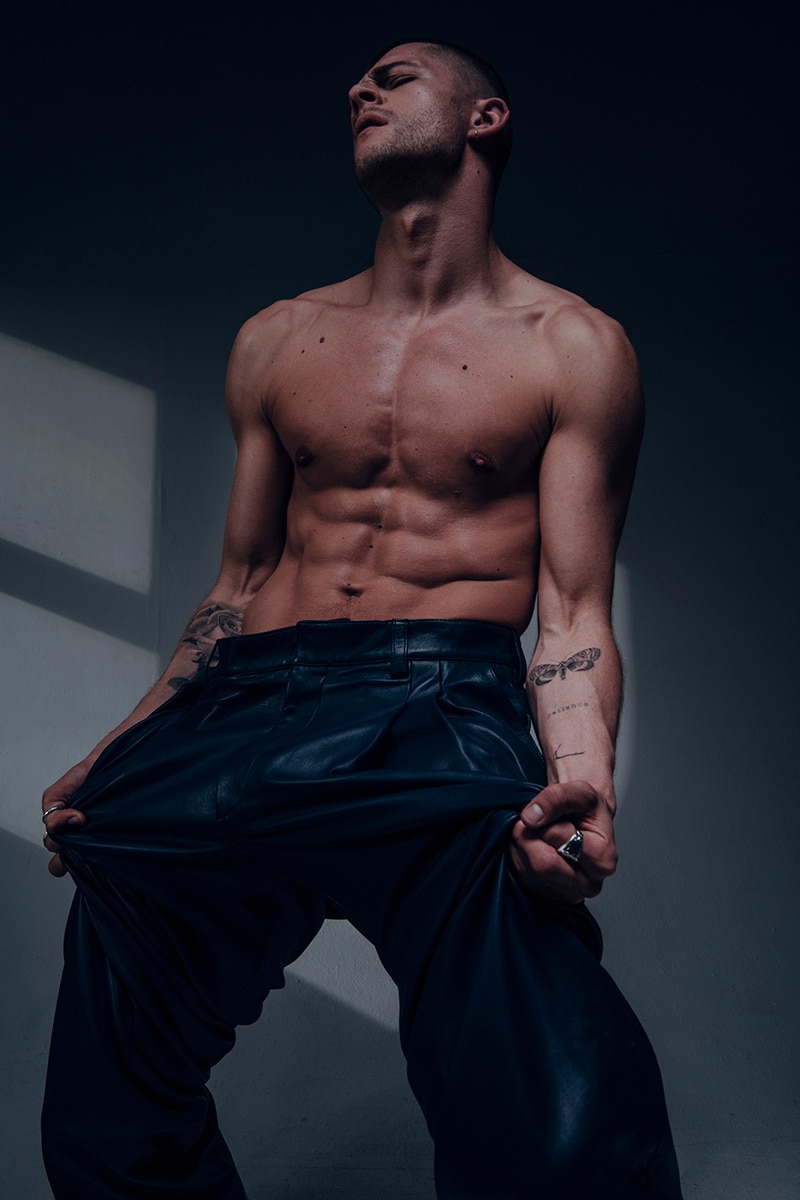
Prior to becoming a dancer and model, what did your previous job entailed?
I’ve done nothing else! I never had a plan to do anything else.
Could you kindly elaborate on the trajectory that brought you to dive into this field?
Dancing and modeling together came to me, I never went looking for a model agency, I never believed I was good enough. I’m under 6ft, I don’t particularly have a high fashion face and the beat rolls on. So, when my agency approached me, I was totally overwhelmed and thought – okay, maybe I can actually do this.
Looking at your creative path, it must feel somewhat crazy to act and be as free as one wants to be. How do you stay true to yourself?
By honestly not taking it too seriously – have a laugh, enjoy the job, and the hustle. It’s busy, vibrant and fun but it’s often difficult as there’s judgment likewise insecurities that come up from the surface. Despite everything, I remind myself that I am not my job, I’m worth more as a human being than any job can make me.
Was there a time when you thought: “I’ve had enough” and all you wanted was to pause yourself and take a break from the ever-paced rhythms of modernity?
Recently actually, coming out of an epic world tour that went on for e18 months, I finished the show in NYC. The bests of the best. I then came back and was like: Fuck. What next? I had a work come down that lasted weeks, I had good days, okay days and really shit days. It was a battle that left me pondering: “What do I actually want to do, am I good enough? Am I ENOUGH?” I had to put the work in, I’m still putting the work in. Today is a good day but I’m aware that can shift quickly, and I’ll have to sit in those feelings and deal with them head-on.
“This too shall pass” – my favorite quote, speaks volumes to me.
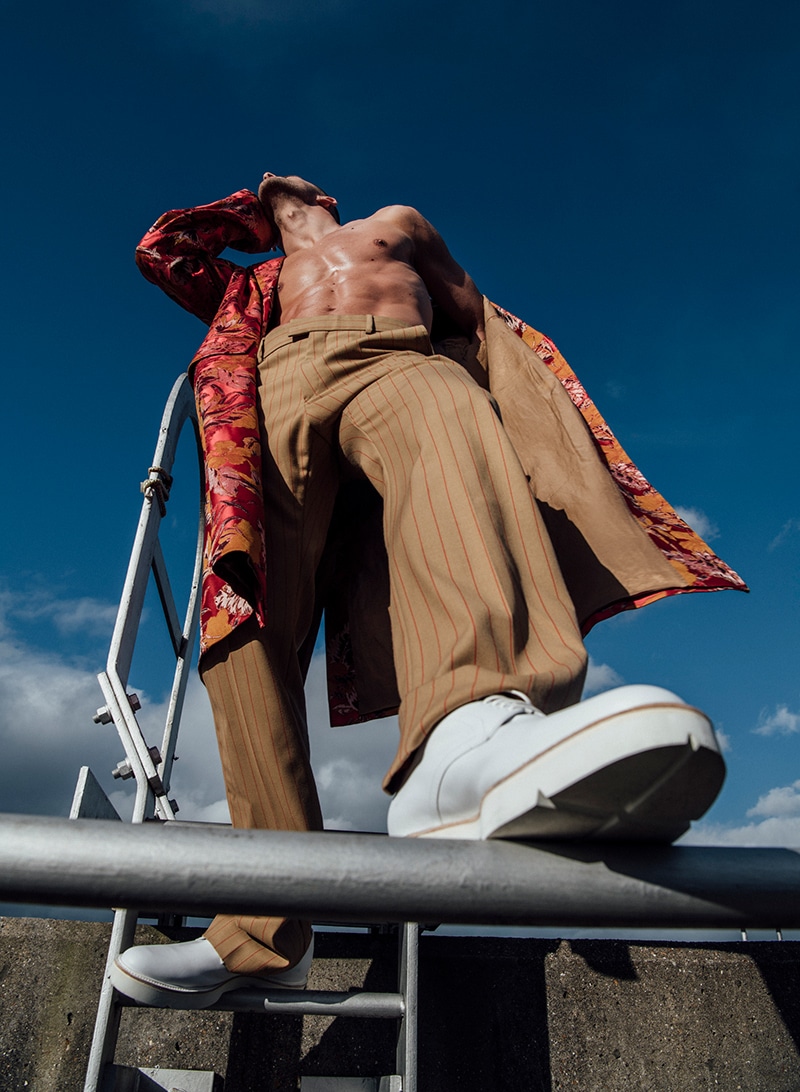
Essentials to bring along your travels for a last-minute job are…
Deodorant, toothbrush, headphones, and phone. Netflix downloads for the plane – clean underwear, obvs.
How do you react to trolling and online denigration?
It depends on my mood, sometimes I’ll call them out if I can be bothered, or I simply don’t react. I don’t try looking for it either. I’m doing a new show in the summer which has had a big public buzz; I don’t look at comments on online socials. I know 99% will be positive but if there’s 1% negative I know that would affect me more, so ignorance is bliss sometimes.
Do you think sexualization in the creative world is still a thing nowadays?
Yes, I do. It’s okay and it’s not. It really depends on the motive; my Instagram is quite sexualized but that’s because I control it and I feel comfortable posting what I post. Some comments bother me sometimes, but that’s the position I put myself in and that’s also what I kind of expect to happen, a comment has never pushed me enough to be deeply upset or offended though.
Sexualization is not okay when the motive is wrong if you make the other person uncomfortable and you know that what you’re doing/saying is wrong.
It’s tricky, as I’m all for expressing oneself but I know in this industry often people’s motives are wrong.
In an era thundered by the ruthless yearning of digitalization and social media appearance, being constantly exposed to the public’s eye must result quite daunting, particularly with the level of saturation present in such a field. In a nutshell, what are your key thoughts in regard to the whole Instagram thing?
The Instagram thing is a battle. I love it. I hate it. I take the app off my phone; I use the app obsessively. I’m learning to control it, I follow accounts that don’t put me in compassion mode, I follow accounts that inspire me, I rarely look at accounts I don’t follow – I also know it’s the highlight reel of everyone’s life, so again – don’t take it too seriously. Enjoy the connection and use it to get inspired rather than compare and despair.
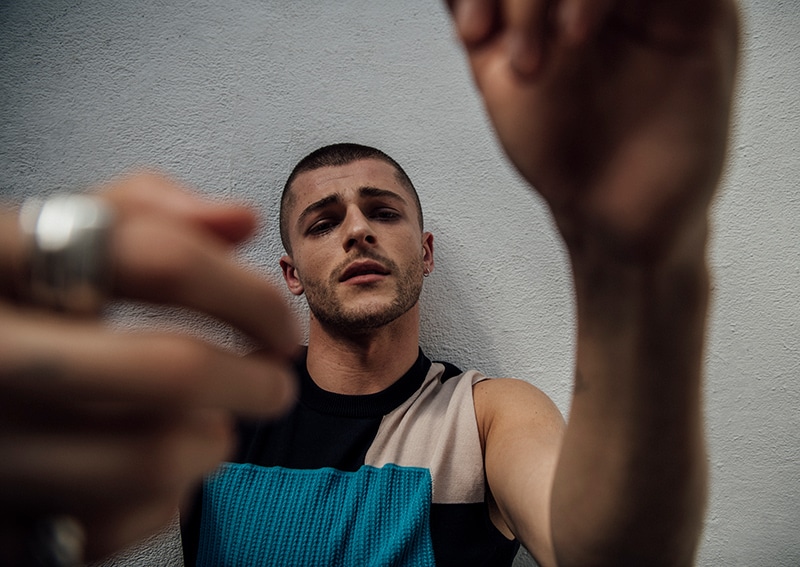
Do social media propel your identity? Or do they destabilize it in a way?
It somewhat helps. Social media is a taster of my identity I suppose but it isn’t 100% my identity. You can be anything online. I try to be authentic and real as much as possible, but I slip into “fake life” pretending everything is fine online when actually I’m feeling rather shit about myself I try to keep it real as much as I’m willing to.
Could you say that spending plenty of time on social media does affect your self-esteem?
It really depends on my mindset at the moment. If I’m feeling shit and my self-esteem is low and I go on Instagram, yes, generally it will make me feel worse. Consequently, I try to avoid it/cut down when I’m in that headspace.
Do you feel somewhat empowered through your social media channels? If so/not, how come?
Sure, it’s nice to have a small platform on social media, to be known or followed for something is actually really lovely, I’m so grateful that people would be interested in following my account.
My favorite is when I get comments about people hearing my story of getting sober and it’s inspired them to do the same; that touches me. And it makes getting candid, vulnerable and really worth it.
I imagine that due to your kind of occupation, you tend to travel a lot. What’s your favorite city and why?
NYC was epic. It’s so iconic, just like I was living in a movie. It reminded me of London, but just fucking taller buildings! It was vibrant, free, multicultural, full of life – I adored it.
If you could pause time and go back to a specific era. What would it be? And why?
The 80’s because I loved the style. Can never go wrong with psychedelia.
What’s been the most gratifying aspect of your career thus far?
Teaching at colleges sharing knowledge I’ve learnt over the years, passing it on and watching students grow is so amazing.
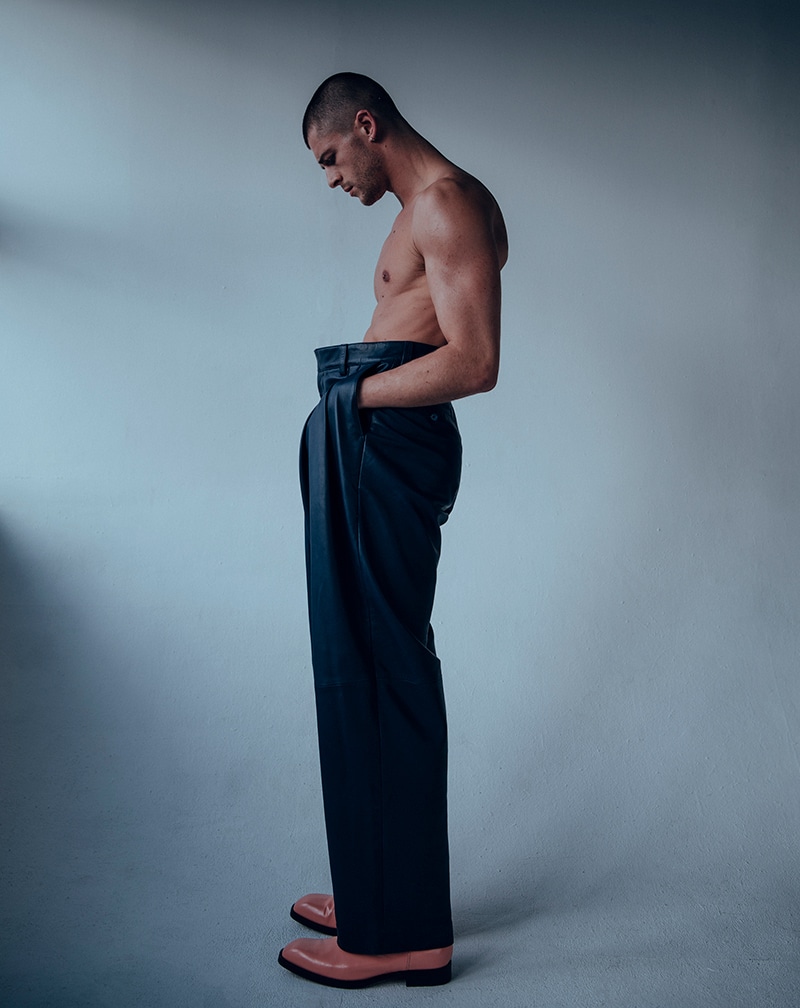
And what’s been the most intriguing?
Learning that you’re just not right for things and there’s nothing you can do apart from accepting it, dust yourself off, and move on. It’s intriguing because you wonder why? Why not? But that’s just the way it is, sometimes you’re 5ft 10, a dancer, brunette, with the same capabilities of a 5ft 10 dancer, that’s blonde… but the client wants blonde. That’s just the way it is.
What about the most fulfilling?
Booking that freakin’ job! You did it. It happened. That’s when rejection is worth it because it does happen with patience, hard work and just a little bit of luck.
Any major inspirations?
I met my dance inspiration in NYC, a guy called Travis Wall – it was like meeting a movie star. I’d watched him online for years (since I was 14) and I actually met him after he came to the show. He said some incredibly kind things about my performance which just meant the world to me. I was fully gassed!
What are the biggest obstacles you’ve had to deal with?
Addiction taking over my work, drive, passion, and relationships with people, places and things.
Who would you like to be remembered for?
Kicking ass and never giving up.
What’s the wisest lesson you’ve learnt being in industry?
If you don’t book, don’t get resentful. Sure, get sad for an hour, feel that feeling. Then get over it. One door closes another door opens.
Any advice to give the young wave of aspiring people, wanting to venture into your world?
Go for it, that’s if you love it. If you can’t think of anything else you’d rather to do with your life, this is yours for the taking. Be willing for rejection, work to achieve your goals, and the minute you don’t want to do it anymore, that’s okay – find something else that sets your soul of fire. That makes you feel alive. You have one life, fucking go for it.
